

Savannah First-Timer's Guide
Plan the Perfect Trip to Savannah
Black History Tours Savannah: Which Ones Are Best?
- THINGS TO DO
- 16 Comments
- by Erin Clarkson
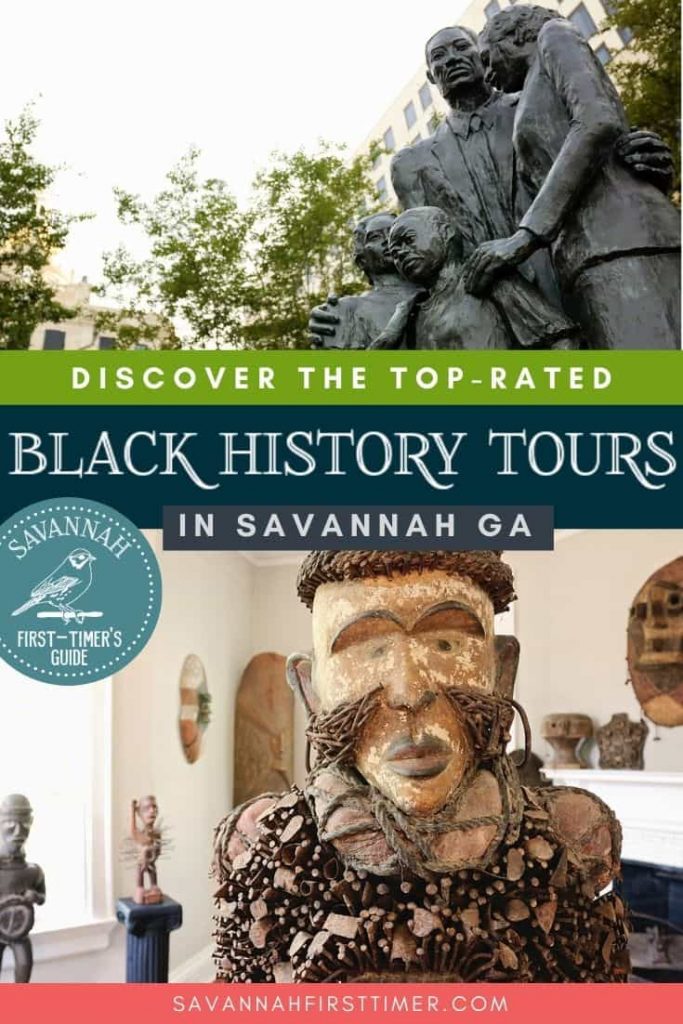
Savannah is a beautiful city with such a complicated history. A good portion of the Historic District was built by enslaved men and women, and — to truly appreciate its beauty — it’s important to acknowledge how the city came to be.
With that in mind, here are some of the best Black history tours in Savannah , with a focus on the ones that make every attempt to get the details right.
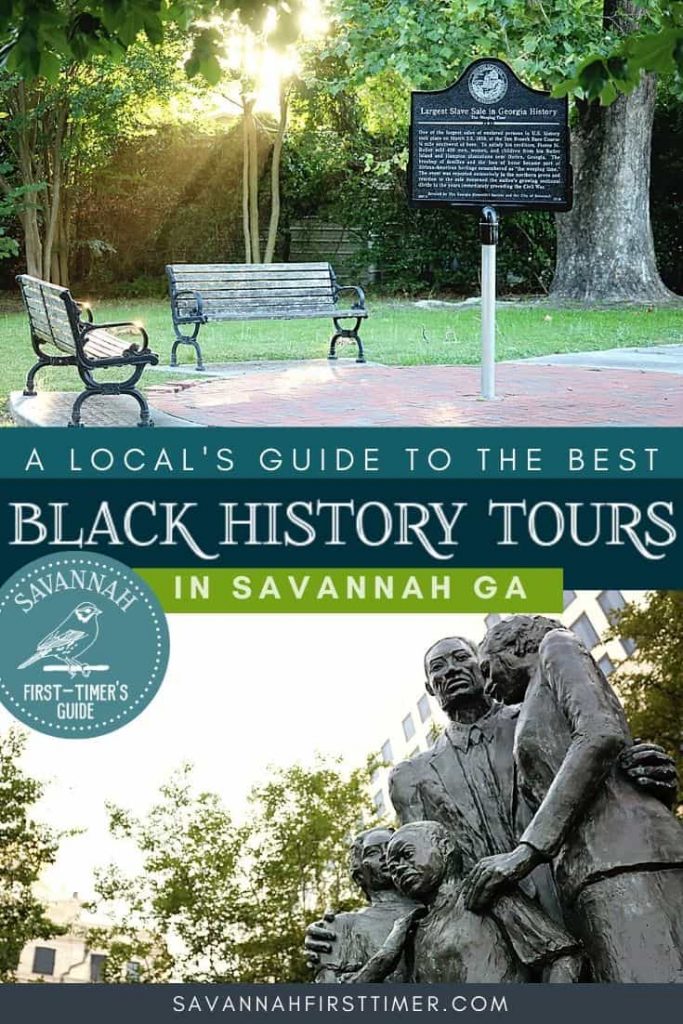
Note: This guide contains affiliate links to my trusted travel partners.
If you’re new around here, first of all… allow me to extend a warm welcome!
My name is Erin, and I authored the Savannah First-Timer’s Guide . It combines my top Savannah travel tips from this website into one handy downloadable guide.
Table of Contents (Skip to a Section)
Black History Tours in Savannah GA
If you’re wondering why you should schedule a Black history tour when you visit Savannah, it’s because it will help you to better understand the complex dynamics of the city.
The tours I’m recommending below are informative ones that will help you learn more about the collective contributions from the Black community — both enslaved and freed.
In a hurry? Here is my top recommendation: ➡️ From Slavery to Freedom Tour You might also be interested in reading: ➡️ A Local’s Guide to the Best Things To Do in Savannah, Georgia ➡️ Savannah Must-See Spots for First-Time Visitors
Pin Point Heritage Museum
Pin Point has long been one of my favorite tours in Savannah! It’s one of the “must see” spots I recommend anytime I have friends or family in town for a visit, and it’s one of the Top 10 attractions listed in my Savannah travel guide .
Y’all, this tour is SO GOOD, so informative, and 100% worth a visit!
The community of Pin Point was established back in 1896. It was founded by descendants of the enslaved men and women who arrived in Savannah from Central and West Africa via the Transatlantic Trade Route.
Those original founders purchased slivers of land along the marsh just south of Savannah and formed the small, self-sustaining community known as Pin Point.
Their main source of income was the A.S. Varn and Sons Oyster Factory, which currently operates as Pin Point Museum.
The tight-knit community was known for their crabbing, shrimping, and oyster harvesting operations. Some of their oyster products were even served at the White House!
Descendants of the original landowners will show you around the former oyster factory while teaching about the beautiful philosophy of the Gullah Geechee people — which is essentially to live off the land and seek only what you need, versus chasing after “wants”.
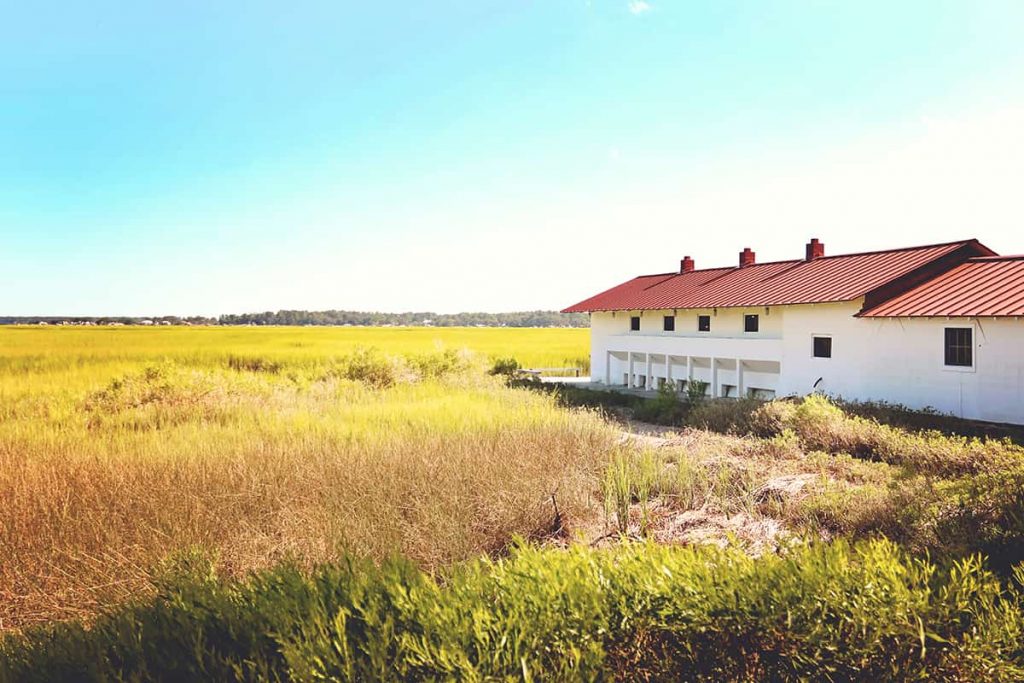
The site is run by the Coastal Heritage Society, and there are learning stations set up throughout the museum.
You can do a self-guided tour, but it’s much better to go on a guided one.
Why It’s Worth Visiting
In addition to being one of the best places in Savannah to learn about the Gullah Geechee culture, Pin Point is also a stunningly beautiful property.
The sunset views from there and nearby Butter Bean Beach are spectacular!
Depending on who you have as your guide, you might learn some of the Gullah language and even a few celebratory dance moves while you’re there.
If Gail Smith is available, I highly recommend requesting her to show you around!
Know Before You Go
- Website: Pin Point Heritage Museum
- Location: 9924 Pin Point Avenue, Savannah, GA 31401
- Tickets: From $5 – $9
- Parking: Their on-site parking lot fits approximately 15 to 20 vehicles
- Time to Allot: Plan on spending two hours at the site
- Note: You’ll need transportation to get to Pin Point from the Historic District
Local Insight: Pin Point is known for being the birthplace of U.S. Supreme Court Justice Clarence Thomas.
FAQ: What Does Gullah Geechee Mean?
Gullah Geechee is a term you’ll hear frequently in Savannah.
The Gullah Geechee people are descendants of West Africans who were enslaved, brought to the U.S., and forced to work on rice, cotton, and indigo plantations throughout the Coastal Empire and the Lowcountry — like the Sea Island cotton plantations on Cumberland Island , for example.
Islanders in the lower region of South Carolina are usually considered Gullah, while Georgians are referred to as Geechee.
“Gullah Geechee” is a sweeping term that encompasses the two. The local dialect is also sometimes referred to as Gullah.
The Gullah Geechee Historical Corridor was established by Congress in 2006 as a National Heritage Area and covers coastal regions in Florida, Georgia, South Carolina, and North Carolina.
Owens-Thomas House
The Owens-Thomas House and Slave Quarters is where you’ll best see the stark contrast between Savannah’s “haves” and “have nots”.
The main home, circa 1819, was designed by architect William Jay — the architect for many of Savannah’s notable buildings — and was built in the Regency style.
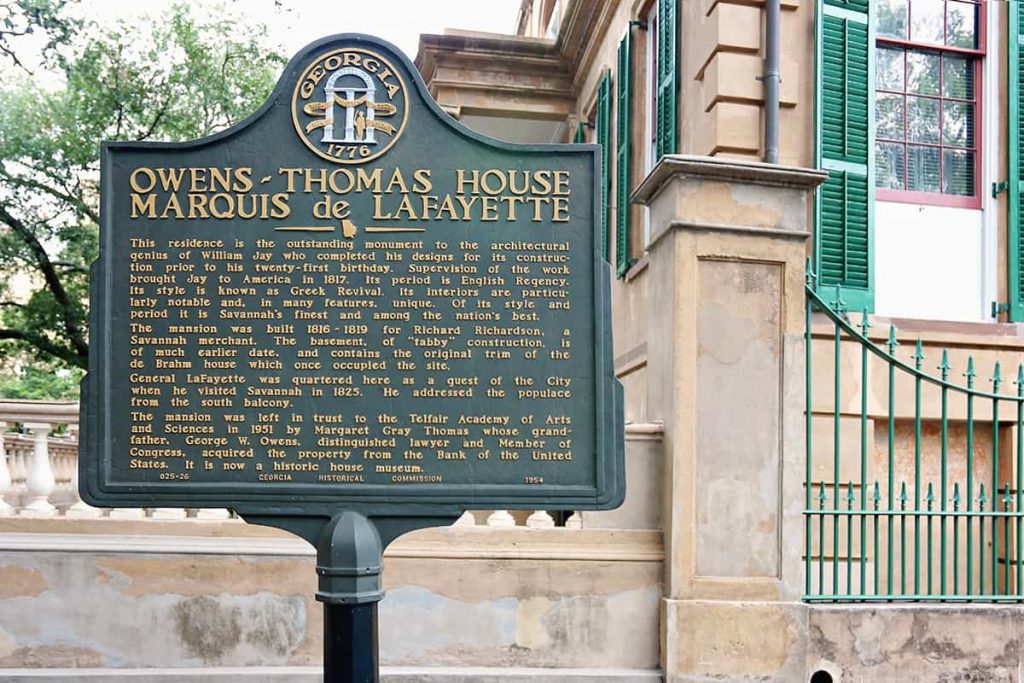
Before touring the mansion, you’ll walk through a small welcome center where you can watch educational videos pertinent to the time period.
The home is listed on the National Register of Historic Places.
The back wall of the welcome center honors enslaved individuals who worked in the home.
It’s a very simple wall covered in names and blank boards representing those whose names could not be retrieved, but it’s particularly memorable.
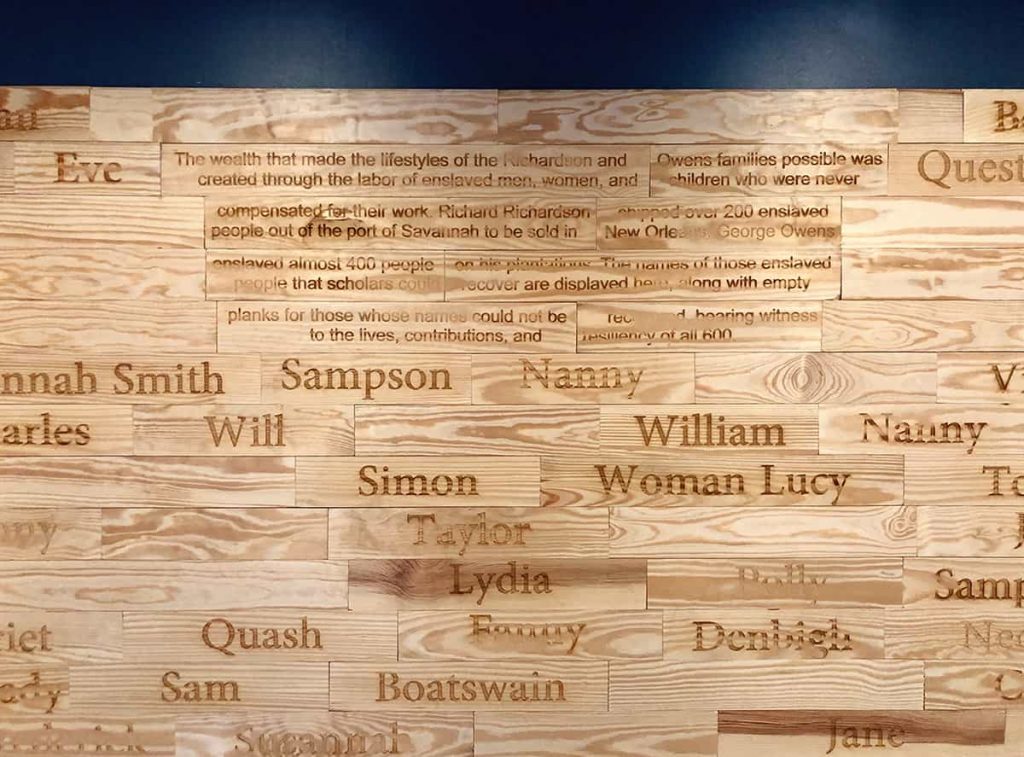
Next, you’ll enter the area where enslaved families resided and will learn what life was like for the men and women who worked inside the home.
Those families were essentially on call 24/7 and worked under the constant scrutiny of the homeowners. They tended to the every need of their enslavers.
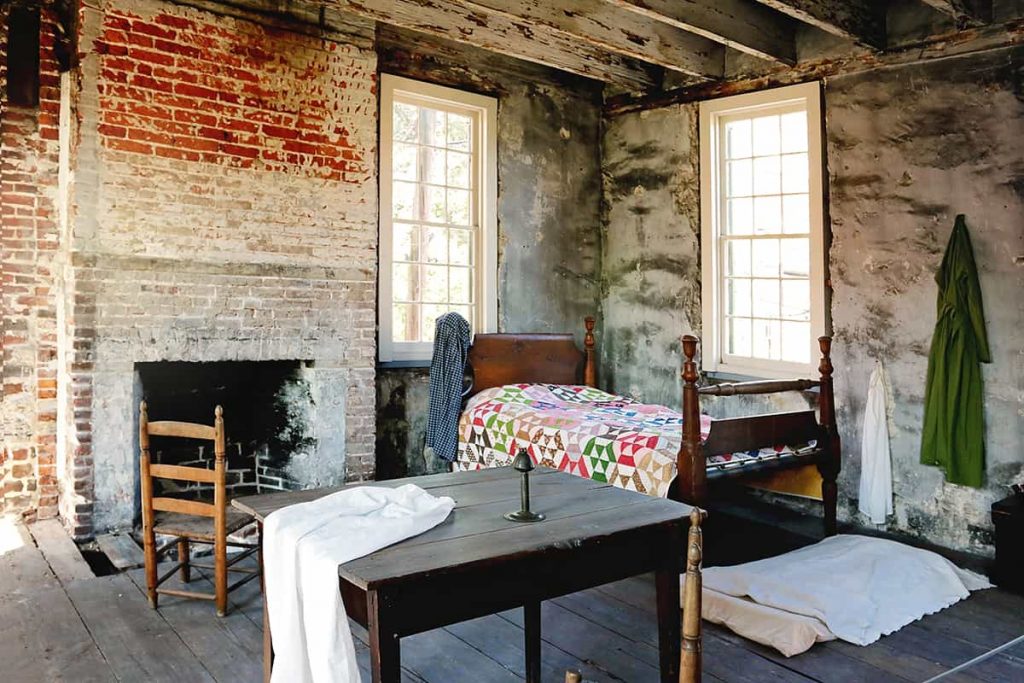
On the flip side, once you enter the main house, you’ll see how some of the wealthiest members of Savannah society lived in the early to mid 1800s.
It’s quite a stark contrast!
The home was clearly designed to entertain and is filled with collectibles and state-of-the-art amenities.
It even had plumbing on all three floors during a time period when employees at the White House were still carrying buckets of boiling water up the stairs for presidential families to use for bathing.
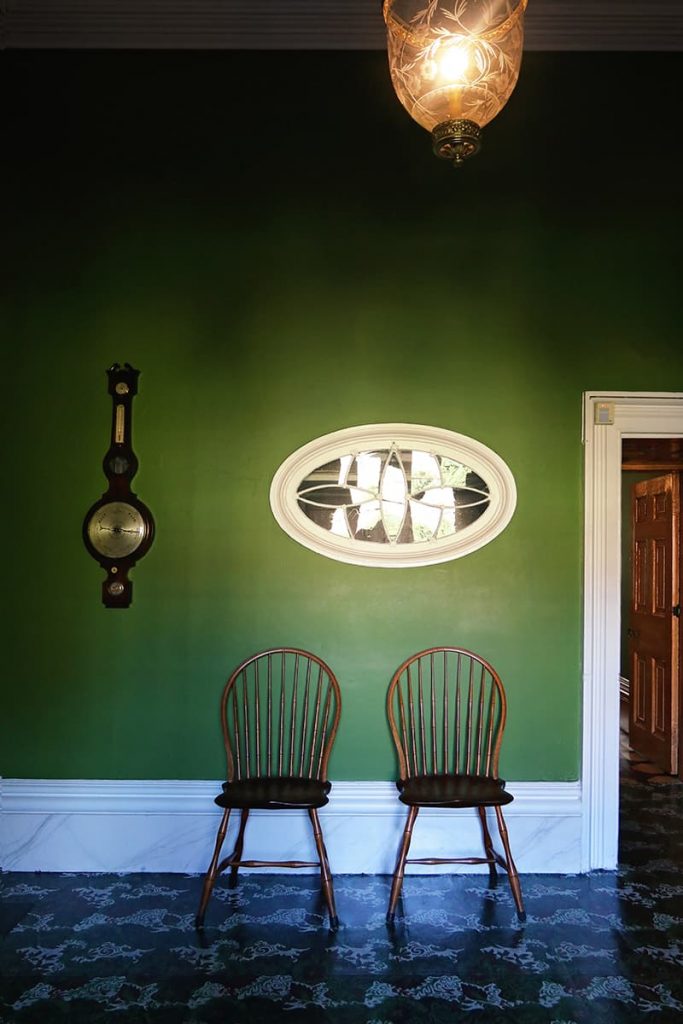
The entire house is fascinating, but I usually spend the majority of my time in the carriage house and the basement area, which is in near original condition.
The basement is where enslaved children were tasked with boiling huge pots of water over the fireplace, which they then poured into large containers that were used for laundry.
The children regularly dealt with scalding hot water and harmful substances, such as lye.
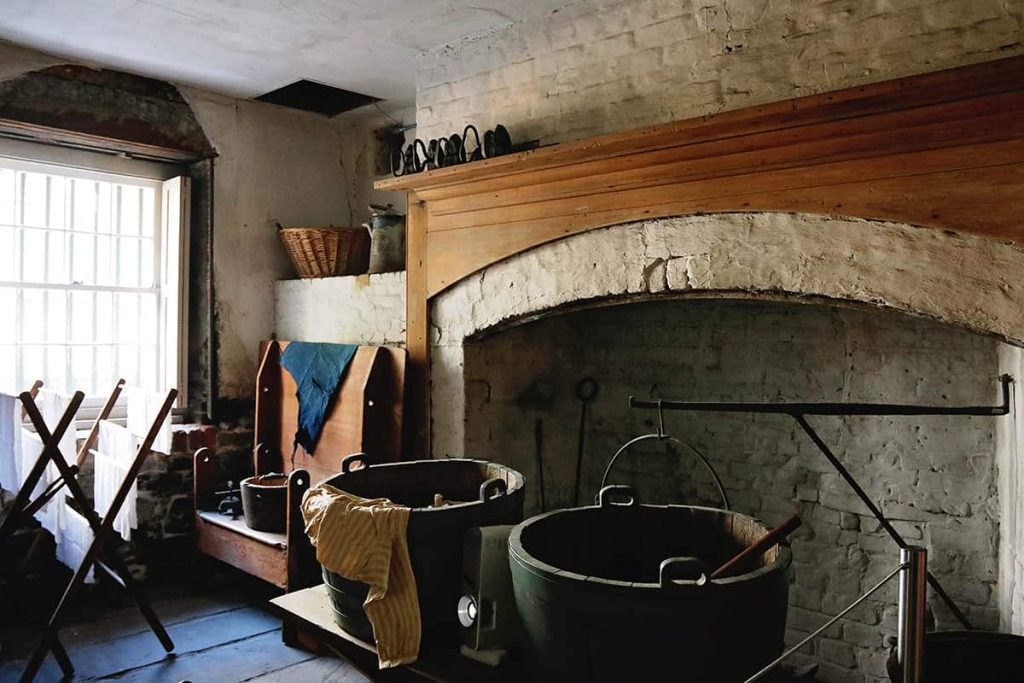
Both the Owens-Thomas house and the area that housed enslaved families are extraordinarily well-preserved.
In some areas of the main home, sections of the floors have been replaced with glass so you can see how the advanced plumbing system worked.
There’s ample signage throughout the home explaining how each area functioned.
If you want to learn what life was like for both wealthy and enslaved Southerners during pre-Civil War times, the Owens-Thomas House and Slave Quarters is one of the more “complete picture” educational tours you can take in Savannah.
Whenever I tour this house, I’m reminded that the early success of this city (and much of the Deep South, in general) was only made possible through the arduous work of enslaved laborers.
It’s a regrettable time in our country’s history, but it’s one that needs to be remembered so it won’t be repeated.
- Website: Owens-Thomas House and Slave Quarters
- Location: 124 Abercorn Street, Savannah, GA 31401
- Tickets: The $20 ticket is a 3-for-1 fee that also grants entry to nearby Telfair Academy and Jepson Center for the Arts. Pay close attention to the instructions that come with your tickets, as you’ll need to stop by in-person to reserve a time slot for your tour.
- Parking: Street parking in the immediate area is metered.
- Time to Allot: The self-guided audio portion of the tour only takes about 45 minutes, but you can explore the basement on your own and it’s filled with treasures. Plan to spend another 30 minutes or so there.
Local Insight: The upper level of the interior of the main house has a very unique indoor bridge, and the ceiling in the slave quarters still shows remnants of the original “haint blue” paint, which was made from indigo dye. The Marquis de Lafayette once stayed in the home and gave a speech from one of the balconies.
FAQ: What is Urban Slavery?
Savannah’s plantation owners usually resided in town — not in fancy plantation homes like you see in Gone With the Wind and similar movies. They hired overseers to run their plantation properties, which were located in marshy areas on the outskirts of Savannah.
The plantations often had unsanitary conditions, and it was all too easy to catch malaria in the rice fields, so for those reasons the property owners preferred to live in town.
Enslaved men and women often lived inside their enslaver’s urban homes and labored daily to keep the property running smoothly.
The concept is referred to as urban slavery, and it’s what you’ll learn about during the Owens-Thomas House and Slave Quarters tour.
First African Baptist Church Savannah
First African Baptist Church is yet another of my all-around favorite tours in Savannah.
It’s amazing how much information the guides pack into a relatively short time frame. Ninety minutes pass all too quickly, and — if you’re anything like me — you’ll find yourself wishing it lasted longer!
The FABC congregation first organized in 1733, and the building is a registered National Historic Landmark.
The tour focuses on notable pastors who served the church through the years, architectural features of the building, and the church’s important role in the Underground Railroad.
You’ll learn about the many hidden symbols found throughout the church and can even see where holes were punched into the floorboards on the lowest level of the building to circulate air for those hiding below.
The entire church was a labor of love that was constructed at odd times — often at night — by enslaved workers whenever they could manage to find free moments of time.
I don’t want to share too much, because I want you to go and experience this tour for yourself!
The oldest black congregation in North America began in 1773. May 20, 1775 the church was born with Rev. George Leile as its pastor; and constituted January 20, 1788 with Rev. Andrew Bryan, Pastor. The First African Baptist Church North America – Historic plaque by the front door
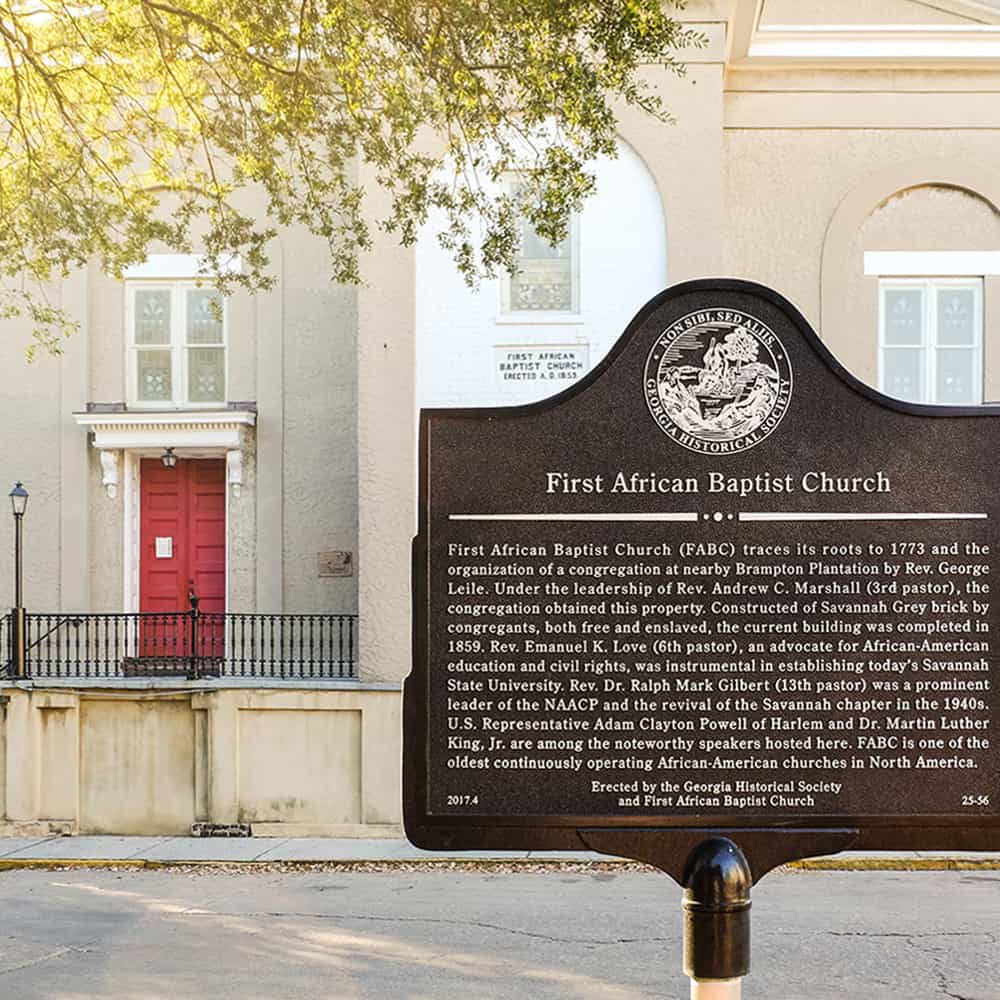
This is truly one of the most fascinating tours you can do in Savannah!
It’s another that repeatedly makes the cut as one of the top ten tours in my Savannah First-Timer’s Guide , and it’s one I practically insist on whenever I have friends or family in town for a visit.
The church has an archives room that contains a treasure trove of information about Savannah. I’d spend days in there if I could.
Guests are allowed inside the archives room, but you aren’t allowed to take pictures in that particular area.
- Website: First African Baptist Church
- Location: 23 Montgomery Street, Savannah, GA 31401
- Tickets: $12 – 15
- Parking: The church owns a private lot at the corner of Montgomery and W Bryan Streets where you can park for approximately $10 . The funds go into a work rehabilitation program for otherwise unemployable individuals. You’ll also find metered parking in the immediate vicinity.
- Time to Allot: Depending on the size of the tour group and how many questions people ask, the tour runs between an hour to an hour-and-a-half.
Local Insight: Most of the lighting fixtures in the sanctuary are original to the church. They’ve since been converted to electric, but were originally gas fixtures.
The Beach Institute
The Beach Institute is part of the King-Tisdell Cottage Foundation, which is dedicated to preserving African American history.
It’s officially recognized as the first school in Savannah specifically created to educate African American children after Emancipation.
The school opened in 1867 with a tuition of $1.00 per month.
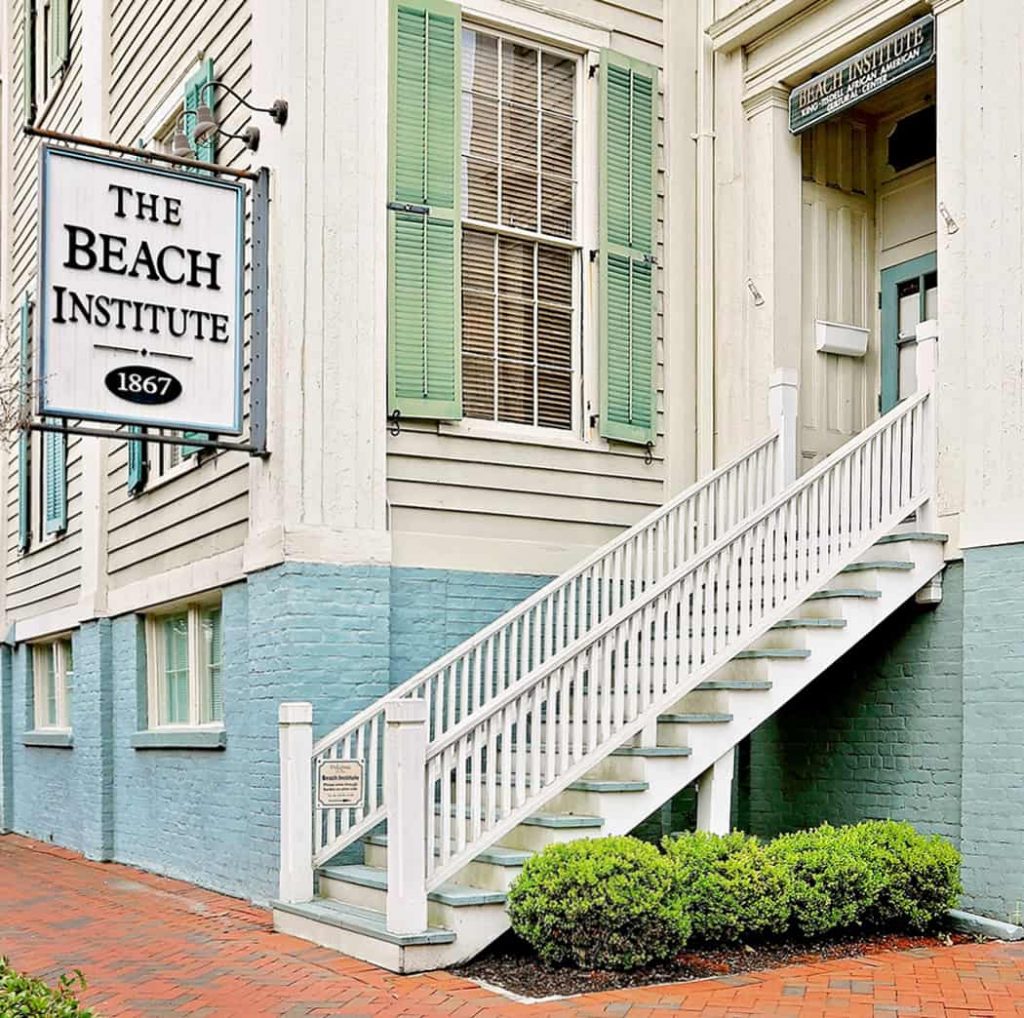
A visit to The Beach Institute is a must for any art or architecture lover.
This former school house hosts permanent and rotating exhibits featuring Black artists. You’ll find sculptures, contemporary art, and thought-provoking creations by local artists in the Savannah-Chatham public schools system.
My favorite exhibit features works by local sculptor Ulysses Davis.
Mr. Davis grew up in Savannah and was somewhat of a local legend. He taught himself to whittle and spent his free time carving small works of art.
He even created his own carving tools, which are on display in the museum.
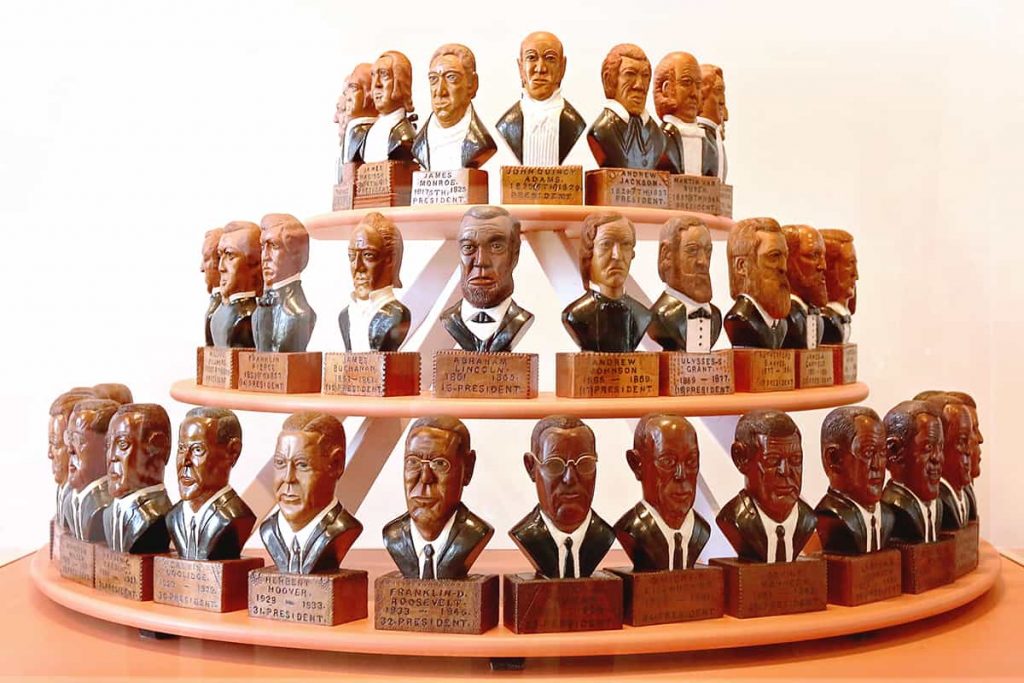
When he was in his forties, Davis opened a barber shop. He displayed his carvings on the interior and exterior of the shop, which was located near Bull and 45th Streets.
Unfortunately, the barbershop is long gone, but the original screen door has been preserved inside the museum.
Guests can also see a recreation of the shop’s interior.
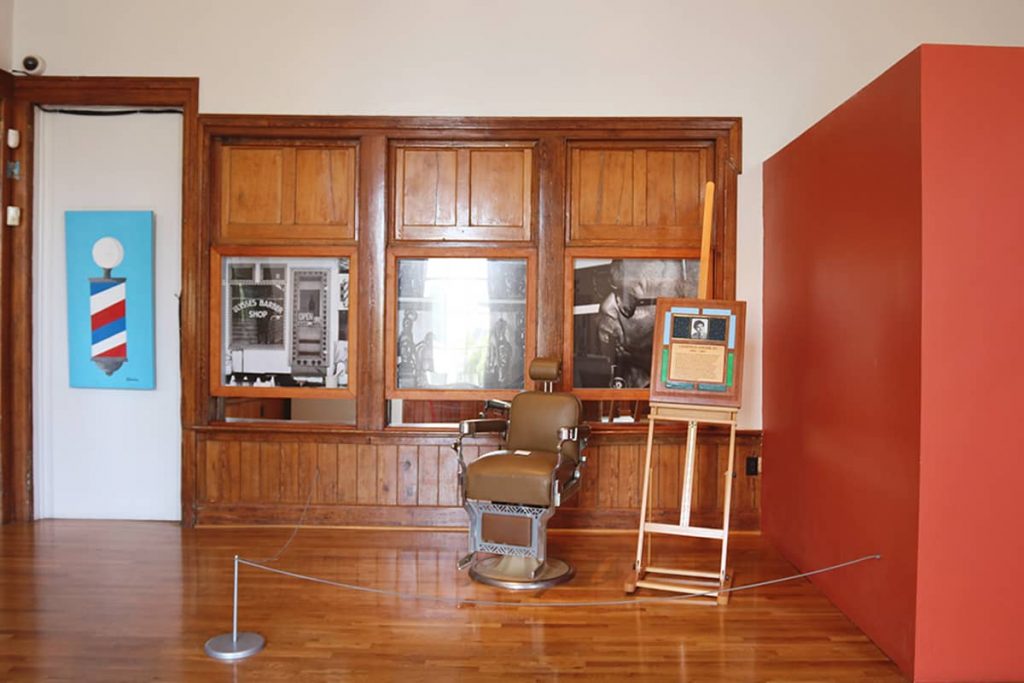
I’m not a very emotional person by nature, but some of the artwork in the rotating exhibits got me a little teary-eyed.
I could sense the raw emotion in many of the pieces — especially in some of the Black Lives Matter displays done by local high school students.
It’s easy to sense the anguish teens are feeling in light of current events in Georgia — particularly the Ahmaud Arbery case.
Emotional moments aside, the carvings by Mr. Davis are a local treasure.
National museums competed for the right to own his works, but the family accepted a lower bid in order to keep the collection intact in Savannah — knowing that’s what Davis himself would’ve wanted.
The museum is primarily self-guided, but there are times when docents are available to answer questions.
I was lucky enough to be able to speak with native Savannahian named Leitha (I didn’t get her last name) during my time in the museum, and she was very knowledgeable about Davis’ creations.
- Website: The Beach Institute & King Tisdell Cottage
- Location: 502 E Harris Street, Savannah, GA 31401
- Tickets: From $7 – $10
- Parking: Street parking in the immediate area is free.
- Time to Allot: Plan to spend 30 to 45 minutes on site.
Local Insight: The architecture of this building is quite impressive. Wait until you see how tall the windows and doors are on the upper two levels!
King-Tisdell Cottage
This beautiful Victorian-style cottage was built in 1896 and was originally located on Ott Street.
It was owned by an African American couple named Eugene and Sara King and later by Mrs. King and her second husband, Robert Tisdell.
The Kings and Tisdells were entrepreneurs and prominent members of the Savannah community. Mrs. King ran a confectionary out of the house.
If you love history, then you’ll enjoy visiting this cottage.
It’s currently the only African American historic home available for touring in Savannah.
While it’s not as fancy as some of the other homes you can tour in Savannah, you’ll learn fascinating stories about the lives of working class Savannahians.
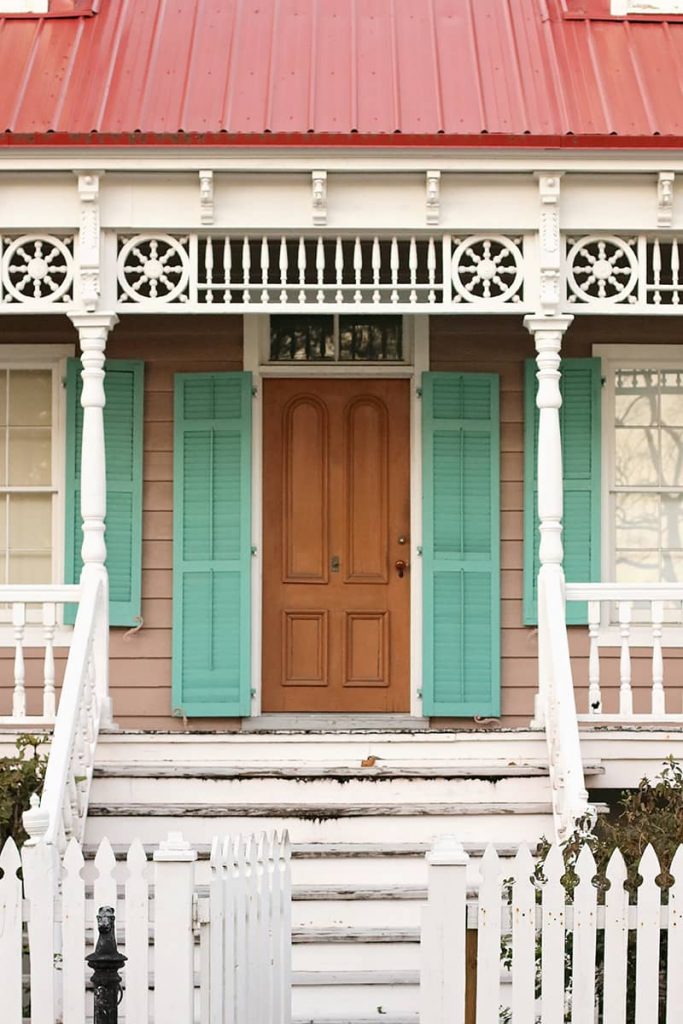
This house contains one of the best public displays of collections from Westley Wallace Law (W.W. Law), local historian and former head of the NAACP in Savannah.
He collected thousands of photographs documenting the lives of African Americans in Savannah, and one full room in the home is dedicated to his findings.
- Location: 514 E Huntingdon Street, Savannah, Ga 31401
Savannah African Art Museum
Founded in 2016, this museum in relatively new to Savannah.
It’s located inside a beautiful historic home on 37th Street and is filled with artifacts from the collection of Mr. Donald Kole.
Most of the pieces showcased within are ceremonial and spiritual items from West and Central Africa.
There are items from 28 different African countries and 180 unique cultures — some permanent and some in rotating collections.
The 1st floor houses objects from West Africa and the 2nd floor covers Central Africa.
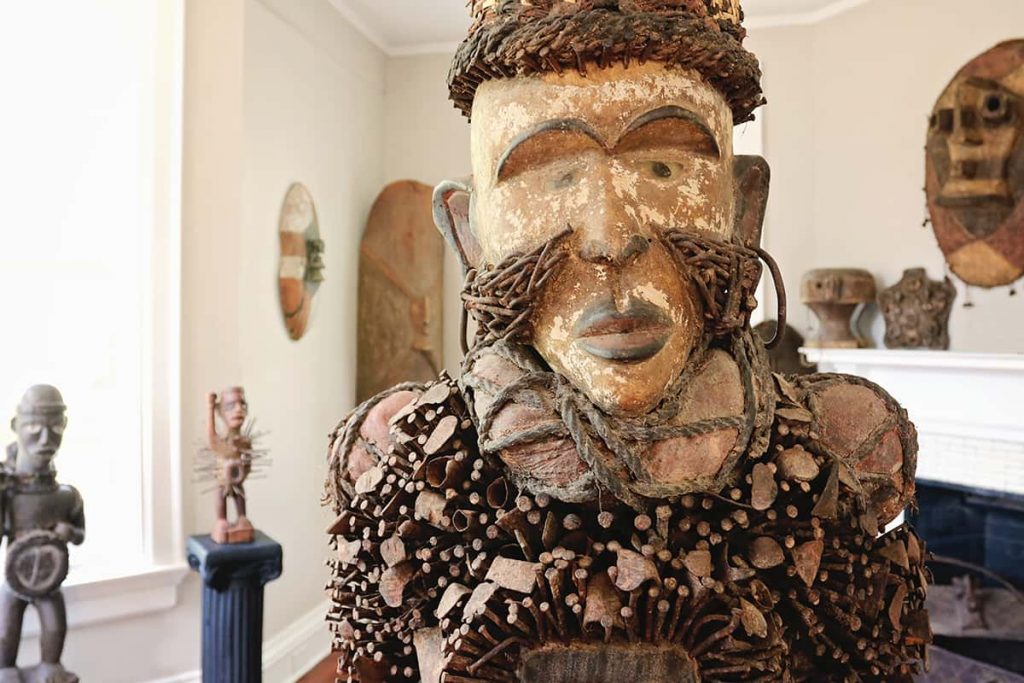
In touring the museum, you’ll learn about the various roles masks, garments, and costumes played in secret societies throughout African culture.
Most items are carved from wood or made of metal, but there are a few samples of pottery and ceramics also on display.
For example, a recent rotating exhibit called “ROOTS: History | Hair | Culture” focused on the cultural significance of African hairstyles throughout history.
Countless American families descended from men and women who arrived in this country from Africa via the Transatlantic Trade Route.
Those families were forced to leave their possessions — and much of their cultural heritage — behind.
This museum contains an incredibly diverse collection of art from many of those African countries. It’s a place where descendants of enslaved families can go to learn more about their heritage.
The museum operates as a non-profit and is completely FREE to the public. It’s a true hidden gem and an incredible gift to anyone who lives in — or visits — Savannah.
My tour guide was Billie Stultz, a recent SCAD graduate and Executive Director of the museum. She’s definitely a walking encyclopedia on the topic of African traditions!
- Website: Savannah African Art Museum
- Location: 201 E 37th Street, Savannah, GA 31401
- Tickets: FREE (you can make donations, if moved to do so)
- Parking: Street parking in the immediate area is free, and there’s also a small off-street parking lot.
- Time to Allot: The guided tour takes approximately one hour.
African American Monument Savannah
This monument in downtown Savannah is located on River Street and depicts an enslaved family who has just been freed.
Their faces are solemn, and the remnants of a broken chain lies at their feet.
It was the first monument in the Historic District to publicly acknowledge the City of Savannah’s role in the institution of slavery — an admission that didn’t come until the early 2000’s.
The monument almost wasn’t approved, since Maya Angelou’s quote at the base of the statue was considered too controversial for the tourism-driven city of Savannah.
Ms. Angelou amended her quote with one additional line at the end, and it was approved after that final addition.
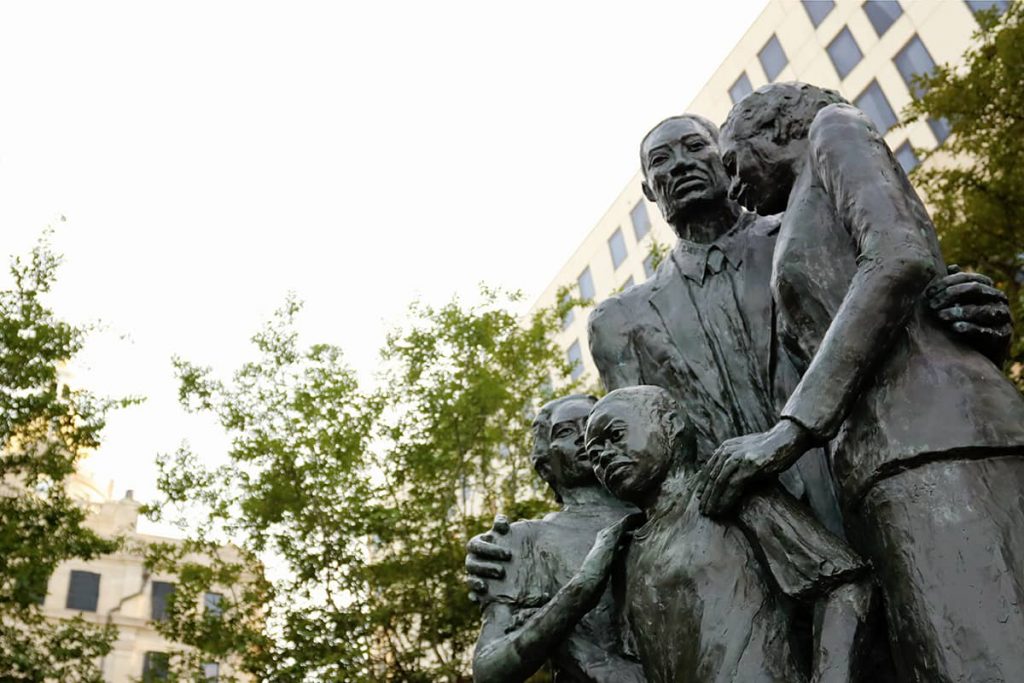
We were stolen, sold and bought together from the African continent. We got on the slave ships together. We lay back to belly in the holds of the slave ships in each others’ excrement and urine together, sometimes died together, and our lifeless bodies thrown overboard together. Today we are standing up together, with faith and even some joy. Maya Angelou – The African American Monument
River Street isn’t just a place to stroll around with a to go cup on St. Patrick’s Day; it’s the place where thousands of enslaved families first set foot on the ground in the United States.
This monument is one of the few places along River Street acknowledging the terrible conditions those enslaved men, women, and children endured before arriving into the port of Savannah.
- Location: 1 W River Street, Savannah, GA 31401
- Tickets: None required; it’s a public monument
- Parking: Parking on River Street is hard to come by. There are a couple lots, but the spaces fill quickly. You can try to park along the E Upper Factors Walk ramp (near Vic’s on the River restaurant) and walk to it. The two closest city parking garages are the Whitaker Street Garage and the Bryan Street Garage. Here are some of my top Savannah parking tips .
- Time to Allot: Plan to spend 5 to 10 minutes on site.
Local Insight: There’s a very unique counterpoint to this memorial tucked away in a lane on Savannah’s east side. It’s known as the Black Holocaust Memorial, and it was created by local artist James “Double Dutch” Kimball.
Related Reading: Why Savannah’s African American Monument was so Controversial
The Weeping Time
“The Weeping Time” was a terrible event that occurred in Savannah. It ended up being the single largest sale of enslaved people in American history.
It happened when plantation owner Pierce Butler, of the Butler Plantation near Darien, GA, squandered his inheritance and was forced to sell off much of the property he owned.
That “property” included enslaved men, women, children. It even included 30 babies.
The sale, which was brokered by Savannah’s former Chief of Police, Joseph Bryan, was advertised in newspapers far and wide. Potential buyers flocked to Savannah to attend the two-day auction, which was held at the Ten Broeck Race Track on Savannah’s far west side.
Enslaved families who had spent their entire lives together on the plantation were separated and sold to the highest bidder in an attempt to settle Butler’s gambling debts and stock market losses.
Between 429 – 436 enslaved individuals were sold during the two-day event.
Since rain poured from the skies the entire two days of the sale — and many say God was weeping for the inhumanity of it all — the event has become known as “The Weeping Time”.
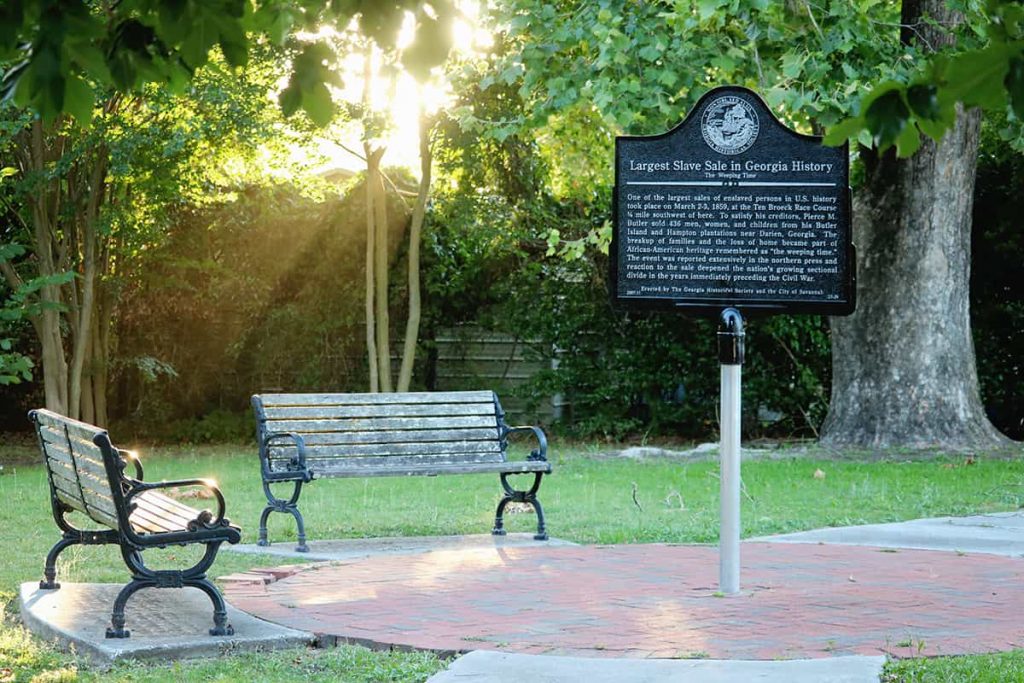
The blades of grass on all the Butler estates are outnumbered by the tears that are poured out in agony at the wreck that has been wrought in happy homes, and the crushing grief that has been laid on loving hearts . Q.K. Philander Doesticks , What Became of the Slaves on a Georgia Plantation: Great Auction Sale of Slaves at Savannah, GA , 1863
The race track is long gone, but you can find a Historic Marker commemorating the event 1/4th of a mile from where the sale took place.
I’ve already mentioned that few places in Savannah make me emotional, but this is one spot that brings tears to my eyes.
The marker sits on a beautiful sliver of land with two nearby benches where you can contemplate one of the darkest moments in this country’s history.
It’s a peaceful spot, located right in the middle of a typical west side Savannah neighborhood full of modest, single-family homes.
As you can see in the photos above, it looks very beautiful at sunset.
- Location: The intersection of Augusta Avenue & Dunn Street, Savannah, GA 31415
- Tickets: None needed. It’s a public area and on city-owned property.
- Parking: Parking in the immediate area is free, but a bit difficult to find. There’s no dedicated parking for the site, and it’s right off of a fairly busy road. You can park on Dunn Street, but please be respectful of the sweet neighbors who live there and don’t block access to and from their homes. NOTE: This is an area I’d advise first-time visitors to avoid after dark.
- Time to Allot: Plan to spend 10 to 15 minutes on site.
There is currently a contentious debate about proposed use for land surrounding the site of the original Weeping Time event, which is slated to house a Salvation Army homeless shelter.
For the record, I’m against using that location for that purpose.
I would like to see The Weeping Time property and the surrounding land utilized as a memorial site and educational center, similar to the Penn Center on St. Helena Island in S.C.
Related Reading: Unearthing the Weeping Time: Savannah’s Ten Broeck Race Course and 1859 Slave Sale
Colored Carnegie Library
Known as the “Library for Colored Citizens” or the “Colored Carnegie Library”, this was one of the only spaces in Savannah where Black families had public access to books in the early 1900s.
Blacks weren’t allowed in the city’s main library at the time (the Bull Street Library), since the library system in Savannah didn’t fully integrate until 1963.
The library was funded by a Carnegie grant of $12,000.
The Colored Library Association of Savannah used donations from the community to purchase the land, and then the building was completed in 1915.
It closed in 1997 due to a water leak in the roof, but reopened a few years later after undergoing a massive renovation that cost $1.3 million.
It still operates as a library today.
Supreme Court Justice Clarence Thomas wrote in his memoirs that he spent many hours in the library doing research as a young adult.
He returned to Savannah in 2004 to help celebrate the library’s reopening.
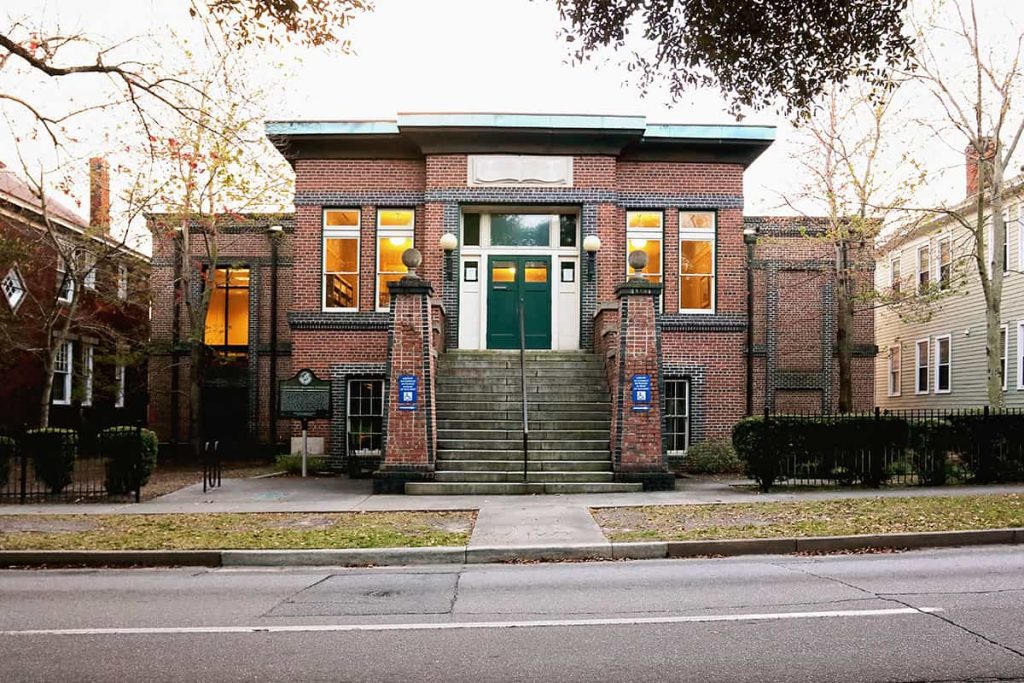
The library was listed on the National Register of Historic Places in 1974. It’s currently part of the Live Oak system of libraries.
- Website: Carnegie Library
- Location: 537 E Henry Street, Savannah, GA 31401
- Tickets: None needed. It’s a public library.
- Time to Allot: It’s an active library, so it isn’t particularly meant for touring. If you go, please be observant of those who are there for its intended purposes. If you only stop by to see the exterior, plan on spending 5 to 10 minutes.
Related Reading: A Local’s Guide to Laurel Grove South
Ralph Mark Gilbert Civil Rights Museum
On Martin Luther King, Jr. Blvd., in what was once the heart of Savannah’s Black-owned business community, you’ll find a three-story building full of exhibits on the era of Jim Crow, racial injustice, and the Civil Rights movement in Savannah.
The exhibits contain historic photos, documentaries, and interactive pieces about discrimination, boycotts, the role of the KKK in the South, and the birth of the NAACP in Savannah.
You’ll also learn about some of the biggest trailblazers in Savannah’s Civil Right movement, including Dr. Ralph Mark Gilbert (who served as the pastor at First African Baptist Church for 16 years), Westley Wallace Law aka W.W. Law, and Rev. Hosea Williams.
Displays posted throughout the museum show the horrific treatment of Blacks in the South during Jim Crow times.
You’ll see signage pulled from local businesses denoting “Whites Only” and “No Negroes Allowed” and displays showing what it was like to sit at a lunch counter during the time of segregation.
Even the building that houses the museum is historic.
It originally served as the Wage Earners Savings Bank, which was founded by Blacks in the early 1900s. It was instrumental in funding many Black-owned Savannah businesses.
The museum does an incredible job of educating visitors on Civil Rights issues as they relate to Savannah, specifically.
It will open your heart to the struggles many faced on a daily basis in Savannah, some of which still exist in the South today in one form or another.
Many of the docents are locals who lived through the Jim Crow era. They provide personal accounts of their experiences in Savannah.
The museum offers an incredible opportunity to speak with them and hear their accounts first-hand!
- Website: Ralph Mark Gilbert Civil Rights Museum
- Location: 460 Martin Luther King, Jr., Blvd., Savannah, GA 31401
- Tickets: $6 to $10
- Parking: Street Parking in the immediate area is metered, or you can park at the nearby Visitor Center and walk.
- Time to Allot: 2 hours
Local Insight: Savannah has a long history of conflict-free protests regarding social injustices. During the Jim Crow era, the local Black community worked together using peaceful methods to enact positive changes, primarily due do the leadership of W.W. Law. In recent years, when other cities saw violent protests and rioting during BLM events, Savannah’s protests were peaceful and without incident.
Guided Black History Tours: Led by Locals
Most of the spots listed above are places you can tour on your own.
If you’d prefer a guided tour where you’ll be able to see multiple points of interest, I recommend exploring the city with a local who can provide first-hand knowledge regarding Black culture in the Deep South.
There are some incredible guides in Savannah who can escort you through the city while providing personal accounts of their experiences as direct descendants (in many instances) of the Gullah Geechee people.
Underground Tours of Savannah
The most popular tour led by Underground Tours of Savannah is the From Slavery to Freedom Tour .
It’s a walking + riding tour through downtown Savannah showing where African Americans lived in the Historic District during the late 1700s to mid 1800s and how they were treated during that time period.
Sistah Patt is the heart and soul of Underground Tours.
She’s incredibly knowledgeable and presents Savannah’s African history in a very engaging manner.
Folks who take her tour rave about her storytelling ability, as well as her bigger-than-life personality…
We just did the Sistah Patt tour today! She is so warm and friendly. Very engaging storyteller and she speaks matter of factly. We learned so much on the tour. The history of the brick walks and honestly the way Savannah tries to deny the slave history was fascinating. Loved! Melissa C. – via my Savannah First-Timer’s Guide private Facebook group
The tour will take you on a few blocks through the NW section of the Historic District. You’ll stop at points of interest such as the African American Monument (mentioned above) and the Cluskey Vaults .
Sistah Patt’s current project is working as an advocate to encourage the renaming of two of Savannah’s squares . Calhoun Square and Whitefield Square were named after men who were avid supporters of slavery.
- Tour Info: From Slavery to Freedom
- Location: 223 Martin Luther King, Jr. Blvd (please verify on your ticket receipt)
- Tickets: Approximately $60 for 2 guests
- Parking: Street parking in the immediate area is metered, or you can park at the nearby Visitor Center and walk.

Footprints of Savannah Tour
This tour is led by Vaughnette Goode-Walker, aka “Sistah V”.
It’s one I’ve yet to try but I’m looking forward to going and have only heard good things about it! I’ll add some photos once I’ve been.
Ms. Goode-Walker is the director of the Ralph Mark Gilbert Civil Rights Museum. She’s also a local historian who has authored two books about Savannah.
Additionally, she was a key consultant in the King Tisdell Cottage restoration and its conversion into a museum.
When I last spoke with Mrs. Goode-Walker (spring of 2023), she had placed her walking tours on hold while busy with an addition to the Civil Rights Museum. You might want to opt for Sistah Patt’s tour in the meantime.
- Facebook: Footprints of Savannah
- Location: Contact for meeting point
- Tickets: Contact for rates
- Time to Allot: 1 hour
Day Clean Journeys Tour
I haven’t done this tour yet, either, but it’s another I look forward to trying.
It’s led by local professor and historian Dr. Amir Jamal Touré. The tour comes highly recommended by Leitha, who was the docent I met while touring The Beach Institute.
Dr. Touré has been recognized by the State of Georgia as an “Outstanding Georgia Citizen.” He is known for his expertise on the Gullah Geechee community.
He was actually the model used to create the male father figure in the African American Monument!
Day Clean (dey-kleen): Each day is a new day; each day starts anew; no matter what occurred yesterday – today is a new day! Gullah Geechee Philosophy and meaning behind the name “Day Clean Journeys”
- Facebook: Day Clean Soul
I know I’ve covered a lot of information in this post, but so many visitors focus on ghost tours while they’re in Savannah that I think the more important cultural sites are often overlooked.
Here’s a free printable to help you remember each of these sites as you make your way around the city.
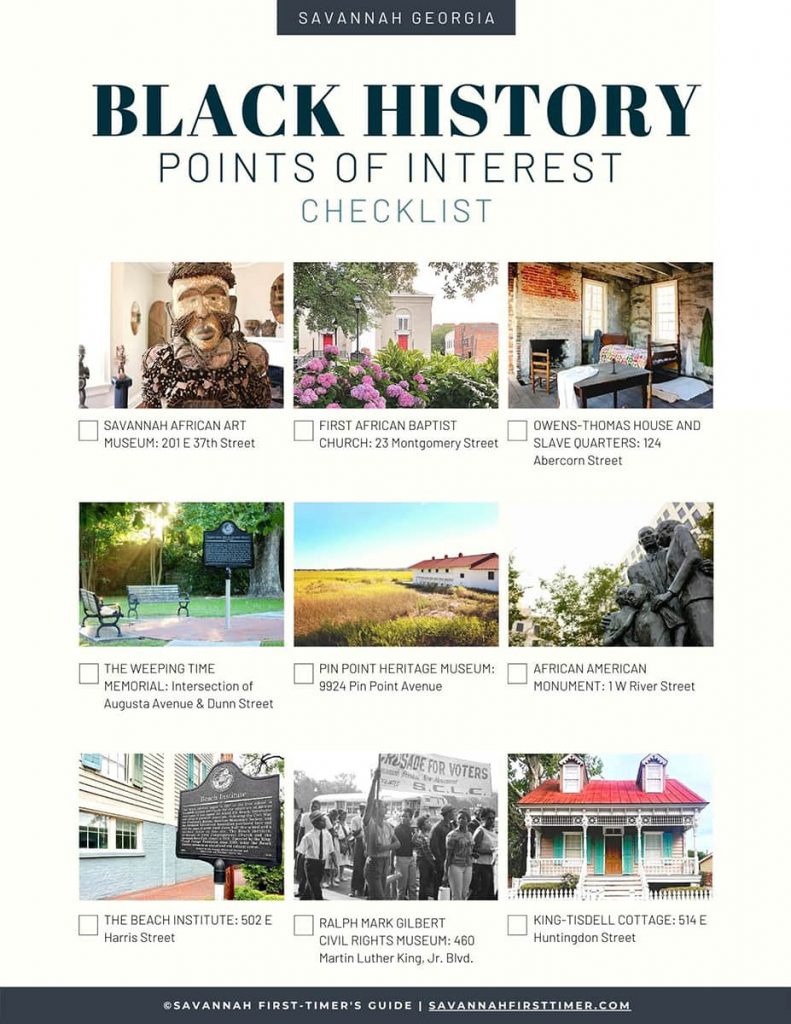
Savannah Travel Guide
Ok, that wraps up my thoughts on some of the best Black history tours in Savannah. If you’ve experienced an informative tour that I missed here, please let me know in the comments below!
If you’re looking for resources to plan a trip to Savannah, here are a few I’ve created…
- Savannah First-Timer’s Guide – My ebook combines my most helpful tips from this website into a downloadable guide. You’ll also gain access to my (very active) private Facebook group with your purchase. Use it to pick my brain about your upcoming travels or read trip reports from others who have recently visited.
- Savannah FTG Free Resources Library – Get a free printable list of “50 Things To Do on Foot in the Historic District (No Car Needed!),” plus more fun goodies.
For more things to do in the city, check out my Savannah trolley tour reviews or read about the best Bonaventure Cemetery tours .
Do you have any questions about Black history tours in Savannah? Let me know in the comments below!
Love this post? Pin it now to save for later!
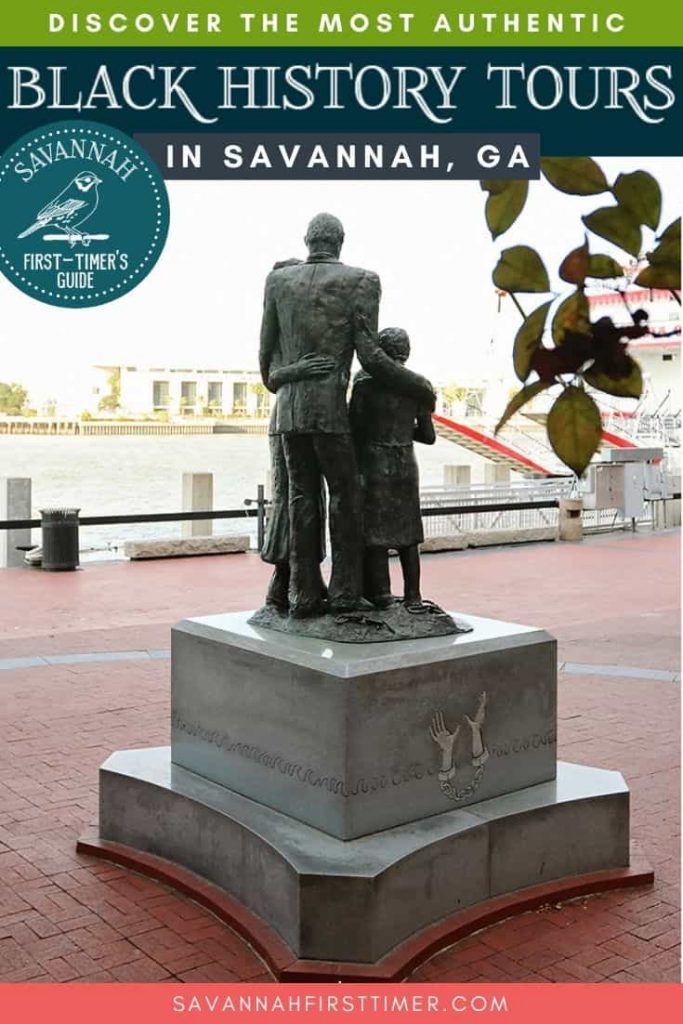
16 Comments on Black History Tours Savannah: Which Ones Are Best?
What great info and love all the bits of history that I wasn’t aware of! I’d definitely want to visit Pin Point and sunsets on Butter Bean Beach with that name! I had no idea the plantation owners usually lived in town. I always assumed they lived on the plantations. So informative!
I thought the same thing until I went on the Owens-Thomas tour! That’s one of the nice things about Savannah…there’s always something new to learn.
This is such an informative article and I love how there are a lot of educational places in Savannah. I’m definitely keeping this post handy for when I return there. 🙂 Thank you for sharing!
This is such an informative post and I found it very emotional. I find it hard to understand why humans treated other humans like this. I hope this never happens again and it is great there are so many museums and memorials to remind us. All lives matter.
This is an absolutely incredible post, I can’t wait to get back to USA so I can visit Savannah! I can’t imagine how much you learn on one of these tours. Definitely bookmarking for later, thanks for sharing!
What a fantastic post. I had not really heard of Urban slavery before (but as soon as I read it, it made sense.) It is sobering to visit sights like this, rather than just reading about them.
The Savannah African Art Museum looks really interesting, too.
This is so informative and a great guide to which tours to do in Savannah. I’ve never been to GA but would love to learn more about the history
Its great to explore the history of a country and its people, and gain a greater understanding of how it came to be.
Hi, Somewhere we saw a black history tour led by a man..and will do private tours. Do you know about this tour? Thanks, Judy
Hi Judy! I believe that’s Dr. Toure, who is mentioned at the bottom of the post under Day Clean Journeys. Try reaching out at this number: (912) 220-5966
Erin, thank you for this incredible post. It is so informative and is such an important part of US history that is oftentimes sadly overlooked or maybe even omitted. Thank you for bringing attention to these places that can be so emotional. and tough to visit. I will definitely share this with friends and family that visit Savannah.
wow! I had no idea there were so many tours available to learn more about Black History in Savannah. Every time I read one of your posts, I realize we need to get back to Savannah–esp considering we live in GA! Thanks for all the information, I look forward to taking some of these tours. It’s so important we learn more about this part of our country’s history.
Thank you for this well researched informative article. I have just returned from my first visit to Savannah and didn’t read this until I returned home. I was able to visit a few of the mentioned sites. Your photos are much better than mine!
I’m glad it was helpful! Since I live downtown, I’m able to visit the museums at random times when they aren’t very busy, so that makes it easier to get good photos 🙂
Checking today, the underground tours of Savannah is no longer listed
I messaged Sistah Patt, so hopefully she’ll be able to fix the site quickly. She is still offering tours. Until her site is back online, you could try reaching out to her via her company’s FB page: https://www.facebook.com/SLAVESINTHECITY
Leave a Reply Cancel reply
Your email address will not be published. Required fields are marked *
Save my name, email, and website in this browser for the next time I comment.
40 Acres and a Mule Tour
bringing you the story of where the quest for racial equity began in america .
Book a tour at
(912) 659-4383 or
One of the "Ten Best Tours in Savannah" -- Conde ' Nast Traveler

The house in which "40 acres and a mule" was conceived on January 12, 1865.
"Highlight of our trip. After we took this tour we cancelled our other tour. It was that good. Everything we wanted to know about Savannah's history we learned on this tour. Fritz Rumpel took us back in time and he also showed us artistically, intellectually and even spiritually the roots of Savannah's wealth and growth. " -- Cassandra F., Atlanta
"Can’t stop thinking about this tour! Savannah's squares and nearby buildings hold seldom-told stories of events with civic and national impact. This tour's knowledgeable creator and guide weaves stories of six squares into a fascinating whole. You won't be bored, and you'll think about what you've seen and heard for days afterward. Excellent value!" -- Diane S., Cincinnati
"Excellent, the unvarnished truth about Savannah! A thinking person's tour! No silly stories about ghosts, old women in hoop skirts or pirates, but real events that affected real people." -- Keith G., New York
"Every person living in America should hear the emotional story that Fritz relays. We are still reflecting on how much this tour moved us 4 months afterward ." -- Corey C., Seattle
"Fritz is awesome! He is an energetic, enthusiastic, and witty storyteller who gives a warts-and-all account of Savannah's history from the founding through the Civil War. African-American history gets its due -- No sugar-coating the slavery stuff, unlike in other places around the South. You'll learn a lot about Tomochichi, too - the Native American leader who helped the colonists get established. And, true to the tour's name, you'll learn how the proposal to give freed blacks "forty acres and a mule" was born in Savannah, and who deserves the credit. (Hint: Not Union General William T. Sherman). A really valuable private tour by someone who is passionate about his hometown. Well worth the $40 each. -- Matthew Z., West Chester, PA

This is the story of Savannah and its significant role in promoting slavery throughout the South and it's the story of the triumph over slavery through faith, culminating in a historic meeting (as depicted in the painting above) in which the aspirations of four million Black Americans became expressed in a single phrase: "40 Acres and a Mule."
You will visit six of Savannah's most historic squares as you learn the truth about crucial events that took place in the city between 1733 and 1865 and that shaped the character of Savannah . Here are only a few of the things you will learn about:

Franklin Square
In dramatic scenes at this square that were set 80 years apart, an enslaved African-American minister and 500 Black children demonstrated their belief in freedom through faith.

Ellis Square
Blacks and whites mingled freely in this Savannah crossroads in the antebellum period at a time when they bought and sold their goods here at the city market. But after the Civil War broke out, the granddaughter of one of those vendors escaped to the Union side.

Johnson Square
The first square of Savannah served in the 1850s as the address for the city's pre-eminent slave trader, who promoted one of the largest sales of human beings in American history: "The Weeping Time."

Wright Square

This monument was built to honor the man who ensured that cotton would be king in Savannah. But the site chosen for the structure desecrated the grave of the most revered person of color in the city's history.

Chippewa Square
The statue honors Georgia's founder, whose vision for his new colony did not include slavery.
Yet on the eve of the Civil War the Vice President of the Confederacy gave a speech just off the square stating that slavery is the cornerstone of the new Rebel government.

Madison Square
It was in the beautiful house overlooking this square where General William T. Sherman set up his headquarters that the U. S. government asked Black Americans for the first time in history, "How can you take care of yourselves?" Their answer resonates to this day.
The 40 Acres and a Mule Tour walks you through the history of Savannah that not only made this meeting on January 12, 1865 possible but also inevitable: It could not and should not have happened anywhere else.
From Franklin Square to Madison Square, from First African Baptist Church to the Green-Meldrim House, you will learn the intertwined history of Savannah's promotion of slavery and the rise of the Black church, the two forces that drove the city's narrative toward the triumphant 40 Acres and a Mule meeting.

Private tours are our speciality.
.jpg)
"My wife and I had the great pleasure of taking a tour with Fritz during our recent visit to Savannah.
"Things we enjoyed:
Punctuality. Fritz was waiting at the prearranged meeting spot by the time we arrived. He had provided a great description of himself. There was no confusion.
Historical knowledge. Fritz had an amazing knowledge of the issues and was able to weave a very compelling story which allowed my wife and I to clearly visualize the time and place.
Multi media. Fritz used audio (music, speeches), visual pictures and his verbal descriptions to us to understand and see.
Tour route. The tour route was fabulous. All sites discussions started with finding a bench to sit and relax and then listening to Fritz’s story.
Group size. There was just the two of us on the tour. After the tour, we talked to our B&B owner, who had recommended the tour and learned Fritz only will do small tours.
After glow. After the tour, my wife and I spent the evening’s dinner discussing the issues Fritz had presented and had a wonderful time reviewing the imagery Fritz had created during the tour.
"Things we didn’t enjoy:
It ended.
"We would strongly recommend Fritz’s tour to anyone who visits Savannah." -- Stuart M., Toronto
More Reviews
Visit us on Facebook @SavannahBlackHistory
- Savannah Black History
- More Things to do
- (Black) Stories
- Tour Waiver
- Laurel Grove South Tour

Bus Tours 1pm Fridays - 1pm and 3pm Saturdays!
Weekday group tours available upon request (10+ people), savannah black history tours.
Experience an immersive journey through Savannah's rich black history with Author and Historian Rita Fuller-Yates. Delve into the city's past, from pre-slavery days to the civil rights movement, uncovering stories of resilience and triumph. With engaging multimedia elements, each 90-minute tour promises an informative and enjoyable exploration of Savannah's black churches, communities, and the remarkable individuals who shaped its history. Join us for an unforgettable experience filled with knowledge, emotion, and maybe even a little fun along the way.
If you have ever been on a Rita Fuller-Yates history tour, you know it's not just about learning factual black history but celebrating black achievements!
This tour requires your participation, so please plan to cheer, cry, dance, and FEEL the love of Savannah's rich black history.
Savannah Black History Tours... "Uplift & Celebrate the bloom of Savannah Black History!"
Nominated "Best Tour in savannah"!
Connect savannah "best of" savannah, savannah magazine "best of savannah".
Nominated Best Tour Company in Savannah
Nominated Best Tour Guide in Savannah
Nominated Best Facebook Page in Savannah
Nominated Best Tour in Savannah
"Best of" The Coastal Empire
Nominated Best Family Activity 2024
Check out our feature in the spring 2024 travelhost magazine!
It's more than a tour... it's an experience.
The Rita Fuller-Yates Savannah Black History Tour!
Other fun things to do
Join us as we journey through the streets of savannah, georgia.
Savannah's only Bus tour with a gift shop on board!
Author and Historian Rita Fuller-Yates Presents Savannah Black History Tours!
Fun for the whole family!
Pick-up/ drop off location
All tours pick up and drop off at the Savannah Visitors Center Located at 301 Martin Luther King Jr. Blvd. - (Parking Lot area) - We are the White bus with the Pink Flowers on top.
** Bus will leave promptly at the listed tour times. *** No refunds will be issued for No-Shows
Tour narrative may include language and or content deemed sensitive to young people.
Please read release of liability waiver, looking for a guided history tour for your group, please send us a message to arrange a group tour.
This site is protected by reCAPTCHA and the Google Privacy Policy and Terms of Service apply.

Someone from our office will follow up with you shortly.
We love our customers, so feel free to message us anytime! Our Staff and Tour guides are ready to help!
SavannahBlackHistoryTours
(912) 604-1869
We look forward to having you join us for one of our Savannah Black History Tours!
Copyright © 2024 SavannahBlackHistoryTours - All Rights Reserved.
- Member Login
- Member Directory
- Current Class
- Ed Feiler Scholarship Fund
Savannah Black History Tours
- Cultural & Heritage Tour
- History Tour
- Motorized Tour


King-Tisdell Cottage Foundation

The Beach Institute African American Cultural Center
Winner of the 2016 governor's award for the arts & humanities of georgia.
The Beach Institute was founded in 1865 by the Colored Education Committee at the dawn of the Reconstruction Era, as the first school built specifically for the education of emancipated African-Americans in Savannah, GA.
Built by Free and formerly Enslaved Negroes, the Institute was completed in 1867 with a generous contribution by philanthropist and inventor Alfred Ely Beach of New York, editor of Scientific American Magazine.
For nearly 50 years, The Beach Institute was operated by the American Missionary Association , an integrated organization of abolitionists and education advocates.
Today, the original historic building is home to The Beach Institute African-American Cultural Center , and owned by The King-Tisdell Cottage Foundation, Inc. The Beach Institute is Savannah's flagship museum for African-American arts, history & cultural preservation.
502 E Harris Street
Savannah, GA 31401
912-335-8868

King-Tisdell Cottage | Historic Site and Artifacts Gallery
Built in 1896 dedicated to preserving the history and culture of african-americans in savannah..
Built in 1896 , this Victorian-styled Cottage was home to Sara King and Robert Tisdell, members of Savannah's vibrant African-American entrepreneurial class.
The King-Tisdell Cottage Museum was founded in 1981 by famed Civil Rights Leader, Historian and Preservation advocate, Mr. W.W. Law .
Today, the restored Cottage is devoted to showcasing various aspects of Savannah's African-American commercial history and culture
Come explore artifacts, exhibits and maps of Savannah's historic Negro Communities from the late 1800s and early 20th Century!
514 E Huntingdon St

Genealogy Research Support Center
Open tuesday - saturday noon - 4 pm other times available by appointment. located at the penthouse of the beach institute..
The goal of the GRSC is to facilitate research and preservation of our vital family histories. The knowledge of our ancestries broadens our scope and understanding of our noble heritage.
Learn about how to initiate, investigate and manage your genealogy projects.
We offer Ancestry.com , Find-A-Grave.com, Newspapers.com & YouTube tutorial videos, as well as charts, forms and methods to organize genealogy research & information.
For information on exhibits, tours, art procurement, student visits and more....
King-Tisdell Cottage Foundation Inc a 501(C)(3)
All Rights Reserved © 2016
Board Materials | Privacy Policy
Photographs by SBS
This site uses cookies. Opt out at any time. More details
Home › Things To Do › Black Heritage
Black History Attractions & Sites In Savananh

Savannah has several key Black heritage attractions, which are explicitly and primarily interpreted as sites of African-American history. Various other sights across the city, although not attractions in their own right, also illuminate facets of this history.
There are also many other attractions that deal with aspects of the historical Black experience in Savannah as part of a broader narrative.
Savannah’s main Black heritage attractions: – First African Baptist Church – Ralph Mark Gilbert Civil Rights Museum – Pin Point Heritage Museum – Laurel Grove Cemetery South – King-Tisdell Cottage – Beach Institute
See also: – African-American history tours – Savannah’s must-see sights – The Haitian Monument – Seafood festivals in Savannah and the lowcountry – Savannah’s events by month: January, February, March, April, May, June, July, August, September, October, November, December
Historic District Sights & Attractions
Savannah’s black history in the colonial & revolutionary periods.
African-Americans have formed a substantial portion of Savannah’s population since the later 18th century, but few physical relics of this earlier history survive into the present.
One hidden trace of Savannah’s Black residents in times past lies beneath the city. Around the area now occupied by Whitefield and Calhoun Squares, was once an African-American cemetery, used for burials since the late 18th century until it was closed and built over in the middle of the following decade.
Though enslaved people often provided the labor for construction of Savannah’s homes and public buildings, few 18th-century structures have survived to the present day. Enslaved people were also tasked with building most of the system of earthworks and fortified positions that once encircled the city.
Few signs of Savannah’s Revolutionary War fortifications survive (with the exception of the reconstructed Battlefield Park), but there is one monument to the contribution of people of African descent to Savannah’s – and American – freedom: the Haitian Monument, in Franklin Square, recently erected in honor of the more-than-500-strong Chasseurs-Volontaires, a regiment of free Black soldiers recruited in the former French colony of Saint Domingue, present-day Haiti.
Historic Black Neighborhoods
19th-century Savannah was highly integrated, with whites and Blacks fairly evenly distributed throughout the city’s wards: often with whites living on the main streets and enslaved people and free Blacks living in the lanes behind.
Nonetheless, there were some areas – particularly around the squares at the margins of the city – in which the concentration of African-American residents was higher. The streets in the vicinity of Greene Square, for example, were popular with Savannah’s free people of color from the early 19th century.
Many of the houses occupied by free Black men and women survive to this day, such as the house of Second African Baptist Church founder Henry Cunningham on Greene Square or the Simon Mirault House, moved to its present Washington Square location from Troup Ward.
Savannah’s African-Americans created their own business districts too. By the 20th century, the most notable of these was the area around what was then West Broad Street (present-day Martin Luther King, Jr Boulevard). This vibrant commercial district grew around the former Union Station, constructed in the early 20th century and demolished 40 years later.
West Broad Street was not just a center of business, but also of Savannah’s Civil Rights movement. Three churches – St Philip AME, Bolton Street Baptist and Mount Zion Baptist – hosted Civil Rights meetings, as did the former West Broad Street YMCA and Savannah Tribune building. Savannah’s NAACP offices were also located along the street.
Slavery In Savannah
It is no secret that Savannah was built upon slavery, and particularly the vast wealth, in the form of cotton and rice, that passed through the city’s River Street warehouses and docks, and from there, to the North and to Europe. In its earlier history, Savannah was a node of the international trade in enslaved people too, receiving many boatloads of kidnapped Africans through its port.
For the most part, this aspect of Savannah’s history is not much acknowledged: one of the few sites in Savannah to explicitly reference the city’s history of slavery is the African-American Monument on River Street. Elsewhere, the legacy of slavery is less obvious.
Unlike at Charleston, 100 miles up the coast, the plantations near Savannah, upon which the majority of the region’s enslaved people lived and worked, have not been preserved. Most of the river plantations have been developed as industrial sites, the few former agricultural lands that remain are either in private hands or have reverted to nature, now conserved as wildlife areas.
In Savannah itself, most enslaved people worked in the homes of the wealthy. Some, primarily skilled artisans and tradespeople, were permitted to live alone and semi-independently under the “living-out” system. This class of enslaved person generally worked for a wage, the majority of which was to be paid to their enslaver.
Some enslaved domestic workers lived in the basement or ground floor of the homes of the people who enslaved them, others in specialized enslaved people’s quarters built in the rear of the main house. Few such accommodations have survived in their original form: the only restored example of urban enslaved people’s quarters in Savannah today is at the Owens-Thomas House.
Savannah’s African Baptist Church
First African Baptist Church, on Franklin Square, is one of the few edifices in Savannah that pre-Civil War African-Americans could claim as their own. Constructed entirely with Black labor, with many members of the congregation coming to work on the project by night once their day in the fields was complete, the church was completed in 1859.
For the few years that remained until Emancipation, First African was also one of Savannah’s sites on the Underground Railroad (another was Fort Pulaski ), the secret system of safe houses by which some enslaved people were able to find their ways to freedom. Today, guided tours and a small museum discuss the church’s interesting and inspirational history.
The Green-Meldrim House, though it is not specifically interpreted as an African-American heritage site, was the location of Sherman’s historic meeting with several of Savannah’s Black leaders, in which they together worked out the details of the famous Special Field Order 15, more widely known as the “40 acres and a mule” order.
The order was read to crowds assembled at one of Savannah’s historic Black churches, the Second African Baptist Church on Greene Square. Besides its 40 acres fame, Second African Baptist later hosted Martin Luther King, Jr, where he gave an early version of his seminal “I have a dream” speech.
→ More about Savannah’s other African-American churches
Savannah’s History From Civil War To Civil Rights
Two museums in Historic District Savannah explore the history of Savannah’s Black citizens from the late 19th century onwards. The Ralph Mark Gilbert Civil Rights Museum on Martin Luther King, Jr Boulevard focuses mainly on the 20th century struggles for equality and the history of segregation in Savannah.
The King-Tisdell Cottage is a small museum located in a historic house, formerly owned by two representatives of Savannah’s Black entrepreneurial class, Sarah and Eugene King. Its exhibits examine the Gullah-Geechee people of the lowcountry, the Black experience in Savannah and the Civil Rights activist WW Law.
The Cottage is located in Savannah’s Beach Institute neighborhood, a historically African-American district named for the school constructed by the Freedmen’s Bureau to provide an education for the city’s formerly enslaved residents.
Before the Civil War, it had been illegal to educate enslaved children, any learning confined to one of several clandestine schools operated out of sight of Savannah’s authorities. One such school was operated by Catherine and Jane Deveaux, whose former home still survives, a few blocks north of the Institute, near Warren Square.
Today, the Beach Institute serves as an African-American cultural center, home to a collection of art centered around the sculptures of local folk artist Ulysses Davis, and also offering art classes and occasional lectures and other special events.
Another of Savannah’s former African-American schools is the present-day Ships of the Sea Maritime Museum, located in one of the city’s most well-regarded historic homes, designed by William Jay for William Scarbrough in the early 19th century.
The museum itself is devoted to Savannah’s maritime history, but an online exhibit documents the history of the house as a segregated school for Black children. Another online exhibit explores the history of the slave ship Wanderer .
A new exhibit at the Massie Heritage Center also looks into the history of African-American education in Savannah.
Beyond The Historic District
Just outside of Savannah’s Historic District is one of Savannah’s most important sites of African-American history. The southern portion of Laurel Grove Cemetery, a segregated burial ground created in the 1850s as a replacement for the white Colonial Park Cemetery and the Black ‘Negro Burial Grounds,’ was the principal resting place for Savannah’s African-American citizens from the remaining few years of slavery through to the 20th century.
The cemetery is one of the largest African-American cemeteries in the South, and holds the graves of many of Savannah’s most significant and influential Black citizens.
A little further afield, a few miles southeast of downtown Savannah, is one of the city’s most unique museums, the Pin Point Heritage Museum. Located in a former oyster canning factory, the museum tells the story of Savannah’s predominantly Gullah-Geechee fishing and seafood-processing community at Pin Point.
African-American History Tours
Several tours in Savannah explore aspects of the city’s African-American history.
Walking tours, geographically centered around the River Street and upper Historic District, focus on the history of enslavement and the trade in enslaved people in Savannah. Minibus tours are able to cover more of the city, and sometimes include admission to history attractions such as the Beach Institute or the Ralph Mark Gilbert Civil Rights Museum.
→ More about African-American history tours in Savannah
More Things To Do In Savannah & Nearby
– Savannah events – Food festivals in Georgia – Closest beaches to Savannah – Boat tours from Savannah and Tybee Island – Ossabaw Island – American Prohibition Museum – Starland arts district – Savannah art galleries – River Street restaurants
© Melanie K Jones 2024
- WORK WITH GABBY
- PACKS LIGHT PRODUCTS
- GABBY RECOMMENDS…
Savannah: A Weekend Itinerary to Explore & Support Black Business
Heading to Savannah, GA soon for a long weekend? Wondering what to do, where to stay, and especially where to eat to support local Black-owned business? I've been to Savannah multiple times because I find the city's charms, activities, beaches, and history irresistible. And we all know that the magic comes from it's rich modern Black and ancestral roots.
So, this article is born: a Black-focused list of recommendations for you to plan your stay around.
Follow this guide will make sure your trip Instagram-worthy, filled with Southern charm and Savannah goodness, and best of all—supporting the Black people that built and build this city.
This post may have affiliate links. Meaning if you buy something using them, I get a small % for recommending it. It won't change the price for you and it's a super easy and nice way to say thanks for the work I did creating this 🙂 Cool? Cool.
Black owned bars in Savannah, GA
📍 109 Martin Luther King Jr Blvd, Savannah, GA 31401
Come for drinks and finger foods in the front room and then head to the larger dining room for a delicious multi-course meal.
The Grey is co-owned by African American chef Mashama Bailey, who has a James Beard Award (and a super infectious laugh!) and Johno Morisano, The Grey's menu changes seasonally in accordance to what is most fresh and naturally available.
Let me tell you… there was not a single thing on the menu I did not like.
And I tried everything— the beef tongue, oysters, fried flounder, beef short-ribs, wine. All of these eateries' awards and accolades are extremely well-deserved, and worth the price tag.

Good Time Jazz Bar
📍 107 W Broughton St, Savannah, GA 31401
Known for their excellent food, excellent service, and of course, excellent live music 6 days of the week. I didn't have time to visit Good Time's Jazz Bar during my weekend in Savannah and it is my biggest regret as it was a must-do suggestion by almost everyone I asked.
💡 Savannah has open container laws like Vegas or New Orleans. The law permits the carry of open drinks as long as they are in plastic, 16-ounce cups (no bottles, mugs, or flasks) and must remain in Historic District limits. These laws definitely play a part in why Fodor's lists it has having one of the Top 10 Largest St. Patrick's Day celebrations in the U.S (and the reason you'll see many bachelor's and bachelorette parties!)
📍 2505 Bull St, Savannah, GA 31401
Say Hey is a Black-owned Savannah sports bar in the Starland District. The bar caters to the “30, flirty, and thriving” crowd, and is one of the few remaining Black-owned businesses on Bull St.
Affordable drinks, great vibe.
Artillery Bar (not Black-owned)
📍 307 Bull St, Savannah, GA 31401
Artillery Bar is a sophisticated speakeasy in a restored armory with mood lighting, imaginative cocktails, and an extensive bourbon list. It's not Black-owned but has great drinks, an interesting history, and is a staple of Savannah.
I ordered the “Smoke and Mirrors” and “Ring Around the Posies” and loved both artisanal drinks.
Black-owned Savannah eats you must try
Geneva’s chicken & cornbread.
📍 1909 E Victory Dr #102, Savannah, GA 31404
If you're looking for traditional Southern fried chicken in Savannah, Geneva's Chicken & Cornbread should be at the top of your list.
I met three generations of Ms. Geneva's family when I visited the restaurant. It's truly family-owned and operated, with Ms. Geneva herself still in the kitchen every day.
If you aren't a friend of fried chicken, don't worry: the collard greens, green beans, gumbo, mac n' cheese, or fried shrimp can win you over.
Back in the Day Bakery
📍 2403 Bull St, Savannah, GA 31401
This is one eaterie that is more often than not found with a line down the street—and for good reason.
Back in the Day Bakery is a Black co-owned restaurant by Ms. Cheryl Day who cooks up some delicious and unique pastries and baked meals like biscuits and gravy, cinnamon biscuit buns, cream-cheese pepper-jelly biscuits, and my favorite…
Can you say ‘strawberry-lavender jam on homemade blueberry biscuits’?
The Original Crab Shack (not Black-owned)
📍 504 E River St, Savannah, GA 31401

The new love of my life for, I think, quite obvious reasons if you look at the photo.
They are technically out of the Savannah city limits and a 30-40 minute drive out to Tybee Island.
Between the almost-absurd portion sizes of the ‘Captain Crab's Sampler Platter' and the Tybee Trashcan drink I ordered, this was the best meal I'd had in a long time.
Not Black-owned —but I still dream about those snow crab legs to this day!
Black-owned hotels in Savannah, Georgia
Unfortunately, there are no Black-owned hotels or guest houses in the city of Savannah Georgia . So if you're reading this and thinking about opening one… this is your sign to do it. We're waiting for you!
Instead, I'll give you some of my favorite recommendations both non-owned, and just outside of the city.
Breezeway Studio Manor
📍 916 Penn Waller Rd, Savannah, GA 31410
Breezeway Studio Manor is 20 minutes outside of downtown Savannah via freeway. Tucked away on Wilmington Island, right between the historic buzz of downtown Savannah and the laid-back vibes of Tybee Island, the bed and breakfast opened its doors in 2013. What makes it extra special? It's the first Black-owned bed and breakfast on the island, owned and operated by local Peggy Blood.
You can choose between guest housing or the bed and breakfast experience. Giant live oaks and pine trees decorate the grounds. Lounging in a rocking chair, sip iced tea while the sun sets, and relax and kick back after a day of exploring.
Perry Lane Hotel (not Black-owned)
📍 256 E Perry St, Savannah, GA 31401
During my Savannah trip I stayed in the center of downtown at the Perry Lane Hotel and had a more than exquisite stay. Like, the beds held me, hostage, every morning with how comfortable they were, and you can't beat the location being less than 5 minutes walking distance to most public Savannah squares.

The Drayton Hotel (not Black-owned)
📍 7 Drayton St, Savannah, GA 31401
The Drayton Hotel is freshly remodeled and the rooms are beautiful!
It's located in the heart of the Historic District*, and features an extremely colorful, bright bar area, a restaurant, and an unmatched rooftop experience with views of City Hall, Savannah River, and the surrounding cityscape.
And if staying in the Historic District inspires you to dive deeper into some history, you should definitely hop on a trolley tour of Savannah * for the most fun way to learn about this rich destination.
💡 For affordable accommodations in Savannah look for short-term rentals just outside of Downtown. However, in central Downtown and in the Historic District, rentals are often not much cheaper than the local hotels. In that case, opt to support small businesses and look forward to experiencing true Southern hospitality.
Black-owned Black history tours in Savannah
Footprints of savannah walking tour.
📍 912-695-3872 (Tours are reserved by phone only and confirmed via text)

The Footprint Through History Walking Tour is less of a walking tour and more of a journey.
As Ms. Vaughnette Goode-Walker will tell you,
“This is not a Black history tour. This is an American history tour.”
She will take you through all aspects of Savannah and Southern history, from Native American interaction with settlers to the times of slavery to Southern economics, the Civil War, technological revolutions, and all things in between.
Come to this tour prepared to listen, but more importantly, to feel the history in Savannah.
- Adults – $25 per person (Gratuity not included)
- Children under 12 years old – $10
Day Clean Journeys
📍 301 Martin Luther King Jr Blvd, Savannah, GA 31415
‘Day Clean' is a Gullah phrase that means “new day”.
Dr. Jamal Touré is a remarkable scholar and teacher who conducts Day Clean Journey , a remarkable trip into the underground African American history of Savannah for his company Day Clean.
Dr. Jamal Touré shared his considerable knowledge of the history of Savannah and the people who built and inhabited the city, along with changes faced by the African-American community over the centuries. Many return customers
Tybee Island
Tybee Island is a 3.5 sq miles allotment of islands and inlets about a 20-minute drive from Savannah. It was settled by the enslaved African Americans who grew to live in tandem with the indigenous tribes. They are century old inhabitants of the Sea Island community, and it has been lovingly maintained and passed down from generation to generation.
The Gulla Geechee Cultural Heritage Corridor is a National Park Service designated heritage corridor that follows the coastline of North Florida all the way up here to South Georgia. When I first left Washington D.C. to visit Savannah, GA my mental image included plantations, sweet tea, and horse-drawn carriages. However, on my descent into Hilton-Head in I was shocked by gorgeous shallow, blue waters and beautiful white beaches.
This special place celebrates Sea Island Gullah and Geechee culture, including its African American and Indigenous roots, stories, music, foodways, art forms, traditions found in the community today—all of which make Tybee Island truly unique.
Whether you are looking to explore historic sites steeped in African-American history or just experience a great beach getaway with modern amenities – Tybee Island is the perfect destination for all.
Popular town for families, history buffs, and water lovers*, this area is easy to walk around self-tour. Or, if you want something more adventurous, take a segway tour and see even more of the area in just one hour. Tybee also has some magical wildlife you can learn about on an eco-friendly dolphin cruise * around the island!
Pinpoint Heritage Museum
📍 9924 Pin Point Ave, Savannah, GA 31406
The community was founded in 1896 by freedmen after the Civil War. The former factory has been transformed into the Pinpoint Heritage Museum educational center for visitors to authentically learn about the Gullah/Geechee culture directly from residents who grew up in the small, close-knit community.
Guests can discover these unique lifeways, from daily life to religion, language and food.
Yogi Soul Farms
YogiSoulFarms is run by David Betts, a young, Black naturalist who offers foraging tours in the backwoods of Savannah, GA.
The focus of the tour is on mushrooms, and you'll come across Lions' Mane, Turkey Tails, and oyster mushrooms, as well as more varied fauna such as loquats (also known as Japanese plums), mulberries, kumquats, chicken of the woods, figs, dates, and prickly pear cactus.

David doesn't believe in profiteering from the knowledge of an Earth that belongs to us all and allows guests to charge what they think the tour is worth.
This trip was sponsored by Visit Savannah .
No, as of October 2021 there are no Black-owned hotels or bread and breakfast accommodations in Savannah, Georgia city limits.
If you're looking for unique Black history, Savannah Georgia is the better city to visit. Savanna intertwined the histories of the indigenous Americans, African enslaved peoples, and even Afro Caribbean populations throughout the 18th and 19th centuries. Another thing that sets a part of Savannah Georgia is its open container of alcohol laws, which draws in large groups, celebrations, and parties year over year. It can have a New Orleans-like feel to it with outdoor celebrations, breezy Willow trees, and an overall relaxing air of joy and comfort.
– Black history and culture – Haunted history and ghost tours – Blockbuster movies including Forest Gump and The Last Song – St. Patrick's Day Celebrations, bachelorette parties
Let's chat in the comments: what questions do you have about visiting Savannah, GA, and supporting the local Black-owned businesses there?

Liked this? Check these out!
Italy itinerary: from cinque terre to amalfi, 19 summer days..., are shampoo bars good for curly travelers i tried 5,..., more than 50 active facebook travel groups to join in..., 6 steps to the perfect travel vision board (free template), what can women wear in dubai an expat’s guide on..., your next budget winter getaway for snow and hot springs:..., 16 comments.
Hello: Someone sent me this link; my Bed and Breakfast (Breezeway studio Manor) is on Wilmington Island, GA (the island sandwich between Savannah and Tybee). I Have been in business since 2014.
I appreciate you sharing this and will follow your advice. In my opinion, Tybee Island and Savannah, Georgia, are among the most forward-thinking communities in the nation and have the most potential for growth in the tourist industry. You may see what I mean by visiting https://visittybee.com/hotels-motels .
The Ashford Tea Company is an amazing spot, black owned and imports teas from around the world. He also customizes tastings and events. There are alot of restaurants and food spots in Savannah – Trick’s BBQ is a must visit, Belford’s is a great black owned restaurant in Savannah’s City Market, and many more. If you are having an event or a destination wedding The Southern Palate is a phenomenal catering service not to mention some amazing event planners K&J Event Designers
Thoroughly enjoyed reading everything I could find about Savannah. I’ve never visited but always been captivated by its Black History, Culture, Southern Charm, Haunted History, Foods, and much much more……… I plan on making a trip there in the near future. I’m an 70 young African American woman who enjoys traveling alone sometimes. Some general questions I would like answered. 1. When is the best time to visit Savannah alone. 2. Are there yet any Black- Owned Hotels/ Bed & Breakfast establishments that I’ll be comfortable in staying. I prefer the Historic District. Or do you have any suggestions? Safety and Expense are my main concerns. 3. How about some black-guided tours on bus/shuttle/etc? Are these feasible! 4. Fantastic along with.being economical black-owned restaurants/eateries/bars etc. 5. And other thought and suggestion for me as a tourist. Thank you.
Headed to Savannah in November. Outside of the Historic District, what are some other areas to stay?
Great Read!!!
I think these spots are really awesome I really want to visit them as soon as I get there! I’m really looking forward to my trip and thank you so much for this!
This is such a great guide! I had only a few hours to spend in Savannah last time I visited, but I have to agree with your recommendations. We spent our time there just walking through the city and it was gorgeous. Also got to dine at Mrs Wilkes which we found through https://www.visitsavannah.com/list/these-5-savannah-restaurants-are-worth-traveling I’d love to go back.
Are these hotels black owned? I’m trying to plan an event and would like to find some, but haven’t been able to. Appreciate your feedback!
Hi Melissa!
Unfortunately, I’ve reached out to the Savannah Tourism Board and they’ve said there are NO Black owned Airbnbs, hotels, or bed and breakfasts in Savannnah :/
Hi Melissa: No, the hotels listed are not black-owned. However, Breezeway Studio Manor is a black-owned BnB. It has been in business since 2014. The BnB is located 15 minutes from Savannah’s historical district and 15 minutes from Tybee beaches, technically, I am on Wilmington Island, next door to Savannah. Look me up! I am the owner.
Going to Savannah tomorrow for my bday weekend. I’m so excited and will definitely be taking some of your suggestions. Thanks Sis!
Happy Birthday beauty! Have fun!
The foraging is so out of box for me, I think I would love to try it! Especially in beautiful Savannah! Also those crab legssss yesssssssss
Can’t recommend both enough!
thanks for the info you shared. I would love to visit Savannah. I’m in my early 70’s with limited walking. Are there any attractions that rent motorized scooters or wheelchairs?
Leave a Comment Cancel Reply
Save my name, email, and website in this browser for the next time I comment.
Gabby Beckford
Gabby is a multi-awardwinning creator. She is a full-time travel influencer, Gen Z travel marketing expert, and public speaker. You'll find her featured in the likes of Good Morning America, National Geographic, CNNTravel, Forbes, Travel+Leisure, and even the TEDx stage.
Influencer rate card breakdown (Free Downloadable Template!)
Housing options as a digital nomad: where do you live.

- Attractions
- Food & Drink
- Travel Tips
- Book A Room

Black History Tour of Savannah

- 301 Martin Luther King Jr. Boulevard, Savannah, GA 31401
- Get Directions
- (912) 232.7477
An educational and interactive tour of Savannah’s Black Heritage with the “Freedom Trail Tour”. Johnnie Brown has over 10 years experience and has been featured in publications such as USA Today and the Wall Street Journal.
Featured Hotel
Quality inn, savannah historic district, upcoming holiday, 4th of july.
Salute to our country’s independence right here in the Hostess City of the South and enjoy the highly-anticipated Savannah 4th of July fireworks!

- ARTS & MUSEUMS
- EDUCATIONAL
- Share / Invite
- Download PDF
- Email Collection

Error report has been sent successfully.
We will review your submission and make any necessary updates.
If you're a band, promotor, venue, or artist representative,
Consider becoming one of our verified users!
- speed up the creation process
- Add multiple events and artist at once
- Skip the holding period and publish automatically
Savannah Historic District Walking Tour
Similar events.

How to spend the ultimate long weekend in Savannah, Georgia

Jun 17, 2024 • 5 min read

Spend the perfect weekend in Savannah, Georgia, with this guide © Sean Pavone / Shutterstock
For those of us in greater Atlanta , Savannah is as close as we can get to the beach. It’s a four-ish hour drive from my home, making it the perfect spot for a weekend getaway.
I like to take a half day on Fridays so that I can get to Savannah with plenty of time to check in and unwind before dinner. I’m usually in no hurry to depart on Sundays, so I'm able to make the most of my time.

Here are my recommendations on how to make the most of your weekend.
- When to arrive: I recommend starting the day no later than mid-afternoon, perhaps around 2pm. If you can swing it, Thursday night is even better!
- How to get from the airport: Splurge on a rideshare to get into the city from the airport since the bus might take an hour or more.
- Getting around town: You’ll most likely be getting around on foot. Taxis and rideshares can cover greater distances, like if you’re going to Tybee Island or south of Forsyth Park.
- Where to stay: Savannah has everything from charming inns to luxury hotels. My favorites are the retro vibes of the Thunderbird Inn , the JW Marriott Plant Riverside District for its museum-esque lobby, and the Alida Hotel , named for a historic preservationist. I’ve also enjoyed a friend’s Airbnb, which lets me feel, at least temporarily, like a local.
- What to pack: The most important thing you’ll need is comfortable shoes, especially if you’ll be getting around on foot. A hat is also a good idea, especially during the summer months. I also like to carry a folding fan to keep me cool. The city is fairly laid-back, so you won’t need to adhere to a dress code unless a restaurant requires it.

Morning: Start your day with breakfast. Dottie’s Market has artisan foods to take with you, like specialty jams and sauces, but it’s the prepared dishes that make it a favorite. The bagel BLT will keep you full for hours. If all you need to get your day started is coffee and a pastry, head to the Coffee Fox down the street.
The shops on Broughton St open around 10am, so once you’ve had a bite to eat, check out the local boutiques like Clockwork Skateshop , Nourish , an organic bath products store, and secondhand threads at Glory Days Vintage .
How to spend the day: Get a quick overview of the city and its history by joining Free Savannah Tours for a 90-minute walking tour. You’ll pay a small booking fee, and tips are encouraged, but you won’t find a cheaper tour in town, running at 9:30 and noon.
Many of Savannah’s iconic homes now operate as museums, so step inside to see how the locals who once owned them lived. The Juliette Gordon Low house is a popular stop for Girl Scouts and grown-ups alike. The Owens-Thomas House & Slave Quarters is an important look at what life was like for both the wealthy merchant class and enslaved people in the 19th century.
After a morning of tours, enjoy an outdoor lunch, picking up picnic supplies from Fancy Parker’s , an upscale outpost of the gas station chain in a historic service station. Grab fried chicken, sandwiches and a soda to enjoy in one of Savannah’s famous squares. Chippewa Sq, of 1994-movie Forrest Gump fame, is a short walk away.
Then head to the City Market, with abundant shops and restaurants. Don’t miss the American Prohibition Museum , which covers the history of the failed experiment and ends in the speakeasy, where you can enjoy a cocktail.
Dinner: If you only have time for one restaurant in town, make it the Grey . Its many accolades are well-deserved, with a menu truly inspired by the region, including oysters and pork cooked in sorghum. If you’re looking for something more casual, Crystal Beer Parlor is a local favorite for its burgers and crab dip.
After dark: River St certainly has its charms, but if you’re not looking for the party crowds, pop into one of Savannah’s cocktail bars like Artillery or Alley Cat Lounge .

Morning: Operating year-round, the Forsyth Farmers Market in Forsyth Park is the best way to start the day. It opens at 9am, and you’ll find both produce sellers and prepared food vendors, so pick up a coffee and pastry to explore. When you’re all packed, make the 30-minute drive to Tybee Island , Savannah’s beach community, where you can get another caffeine fix at Tybean . (If you don’t have a car to make the trek, get a hotel pool pass and chill for the day at somewhere like the Thompson or the Alida.)
How to spend the day: Pick up lunch from Finches Sandwiches & Sundries in Thunderbolt on your way. The Romaine Empire is a fave, best with a side of Old Bay-dusted tots to share.
If you just want to lounge in the sand and surf, settle in for the afternoon. But if you’re looking to explore, wander to the historic pier, which has been featured in movies like The Last Song (2010) and Baywatch (2017) or hit the trails at Fort Pulaski . Take a tour of the 1773 Tybee Lighthouse or cool off with a cold one at Back River Brewery .
Dinner: Before you head back downtown, enjoy a seafood feast at one of the island’s restaurants. Sea Wolf has quirky decor, tiki-style cocktails, and a menu of oysters and fancy hot dogs. The Crab Shack is a Tybee staple, with tables tucked amongst the trees where diners eat heaped portions of shrimp and crab.
After dark: Back in Savannah, if you’re not too tired and sunburnt, join one of the after-hours ghost tours of the city, or belly up to the bar at the Original Pinkie Masters , one of Savannah’s oldest dive bars.
Morning: For your last day in town, get an early start by heading to the Starland District for breakfast. Flora and Fauna serves biscuits, breakfast sandwiches and beautiful pastries, while Big Bon Bodega makes freshly baked bagels daily.
How to spend the day: Explore the district’s many shops and businesses like Two Tides Brewing, which has coffee in the morning and pints come afternoon. Pop into Superbloom for jewelry and gifts and Graveface Records & Curiosities for records and offbeat knickknacks. Grab a slice from Starland Yard , an open-air food hall made of converted shipping containers.
When you’ve had your fill, head back to the hotel to check out, saying goodbye to the city – only until your next weekend visit.
Explore related stories

Jun 24, 2024 • 7 min read
Experience Savannah's Southern charm without spending a penny with this guide to the city's best free experiences.

Jun 20, 2024 • 10 min read

Jun 20, 2024 • 8 min read

Jun 19, 2024 • 4 min read

Jun 13, 2024 • 4 min read

Jun 11, 2024 • 4 min read

Jun 6, 2024 • 7 min read

Jun 5, 2024 • 8 min read
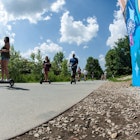
Jun 4, 2024 • 4 min read

Jun 1, 2024 • 7 min read

IMAGES
VIDEO
COMMENTS
It's now home to Savannah's African American Arts Center. CULTURAL HERITAGE. Dating to the 1890s, the King-Tisdell Cottage has served as a cultural museum of African American arts and crafts for more than three decades. FORTY ACRES AND A MULE. On January 16, 1865, General Sherman issued Special Field Order #15 in a field on the outskirts of ...
Tour exploring the role of African-Americans in the history of Savannah and Georgia. Available daily, morning or afternoon. Adults $25, seniors (62+)/students $20, children (6-17) $18, young children (0-5) $10. Call 912-220-5966 or email [email protected] for reservations. More details.
Location: 124 Abercorn Street, Savannah, GA 31401. Tickets: The $20 ticket is a 3-for-1 fee that also grants entry to nearby Telfair Academy and Jepson Center for the Arts. Pay close attention to the instructions that come with your tickets, as you'll need to stop by in-person to reserve a time slot for your tour.
40 Acres and a Mule Tour is the private, two-hour Savannah walking tour that covers the town's history of slavery and emancipation from its founding in 1733 to the end of the Civil War in 1865. ... African-American history gets its due -- No sugar-coating the slavery stuff, unlike in other places around the South. You'll learn a lot about ...
Experience an immersive journey through Savannah's rich black history with Author and Historian Rita Fuller-Yates. Delve into the city's past, from pre-slavery days to the civil rights movement, uncovering stories of resilience and triumph. With engaging multimedia elements, each 90-minute tour promises an informative and enjoyable exploration ...
Savannah Black History Tours: Discover the fascinating history of Savannah's black community through these guided tours, which showcase important landmarks and narratives of African American culture. 13. Sabreee's Gullah Art Gallery: Explore the vibrant Gullah culture through the artwork and crafts showcased at this gallery, which celebrates ...
Honoring Savannah's Timeless Impact: Commemorating 250+ Years of Dynamic Black Culture For over two and a half centuries, the vibrant city of Savannah has proudly commemorated a robust legacy of black history. From notable landmarks and educational institutions to the flourishing enterprises of modern black entrepreneurs, the city's dynamic African American culture and affluent heritage stand ...
The Black History Walking Tour in Savannah offers a 2-hour immersive experience, starting from Yamacraw Square in Savannah, GA. This tour delves into the rich history and cultural significance of African influence in the area, highlighting landmarks such as Ellis Square.. Participants will explore the diversity and culture that have shaped Savannah, including the history of Haitian soldiers in ...
Immerse yourself in the African American journey from slavery to freedom during the Antebellum days on the coast of Savannah. Be transferred from your hotel to the starting point and join a walking tour through historic landmarks such as River Street and Johnson Square. Board a vehicle directly at your hotel, then get dropped off for a guided ...
Experience an immersive journey through Savannah's rich black history with Author and Historian Rita Fuller-Yates. Delve into the city's past, from pre-slavery days to the civil rights movement, uncovering stories of resilience and triumph. With engaging multimedia elements, each 90-minute tour promises an informative and enjoyable exploration ...
The best part, for me, was visiting the Beach Institute of African American Culture (established 1867) and meeting the very friendly people there. ... I had expressed interest in a Black history tour of Savannah and my Uber driver had provided a flier for this tour. ... (912) 398-2785 301 MLK Jr BLvd - VIC, Savannah, GA 31401. Read all replies ...
Discover Savannah's black history on this 2.5-hour bus tour around the city. Explore Savannah's historic downtown district, stopping at significant sites like the First African Baptist Church, the Beach Institute and more while watching an on-board DVD detailing Savannah's black community before and after the Civil War. Also, try a free sample of some conch salad at Ye Old Herb Shoppe, a ...
The Underground Tours of Savannah: Led by the dynamic Sistah Patt, this tour sheds light on the city's lesser-known narratives, venturing into the dark underbelly of Savannah's past. ... Immerse yourself in the vibrant world of African and African American art at this stunning museum. Explore diverse exhibits showcasing the creativity and ...
The African American History Walking Tour in Savannah offers a 2-hour immersive experience with a live tour guide available in English for participants. The tour guides are extensively trained in African American history, ensuring historical accuracy and providing in-depth insights into Savannah's past. Group sizes are kept small to enhance ...
The Beach Institute is Savannah's flagship museum for African-American arts, history & cultural preservation. 502 E Harris Street. Savannah, GA 31401. [email protected]. 912-335-8868.
Overview. Uncover Savannah's hand in the Trans-Atlantic Slave Trade during this walking tour, which focuses on the enslavement of African Americans. Hear true stories of the slave trade and see historical buildings and remnants, including the area where the slave marts and jails were established and monuments dedicated to the heroism of the time.
Savannah's main Black heritage attractions: - First African Baptist Church. - Ralph Mark Gilbert Civil Rights Museum. - Pin Point Heritage Museum. - Laurel Grove Cemetery South. - King-Tisdell Cottage. - Beach Institute. See also: - African-American history tours.
Savannah, Georgia. 1st Day: We'll travel to historic Savannah, GA today. This afternoon we will enjoy a guided tour with a focus on Savannah's African American History. The tour will start at the African American Monument located at the Savannah River, and will also highlight places where enslaved Africans dwelled as they toiled in ...
By delving into Savannah's Black history, you'll gain a deeper understanding of this complex and captivating city. Some of those tours include: Footprints of Savannah: Led by the captivating Vaughnette Goode-Walker, a fifth-generation Savannah native, this tour delves into the lives of prominent African Americans who shaped the city's cultural landscape. From the bustling Reynolds Square to ...
If you're lucky, you'll get a tour by Vaughnette Goode-Walker, a Savannah native and historian who runs the Footprints of Savannah Walking Tour, showing slavery's impact on Savannah's local economy. And don't leave without visiting the gift shop for books, T-shirts and other items related to African American history. Pin Point Heritage Museum
Sponsored by the Association for the Study of Afro-American Life and History, starting in 1979, the Negro Heritage Trail Tour offered tours of historic Savannah from a black perspective. Going to Market, A Scene near Savannah, GA - Ed Abbey, in Harpers Weekly, May 29, 1875 - W. W. Law Art Collection
Sey Hey. 📍 2505 Bull St, Savannah, GA 31401. Say Hey is a Black-owned Savannah sports bar in the Starland District. The bar caters to the "30, flirty, and thriving" crowd, and is one of the few remaining Black-owned businesses on Bull St. Affordable drinks, great vibe.
Black History Tour of Savannah. 301 Martin Luther King Jr. Boulevard, Savannah, GA 31401. Get Directions. (912) 232.7477. An educational and interactive tour of Savannah's Black Heritage with the "Freedom Trail Tour". Johnnie Brown has over 10 years experience and has been featured in publications such as USA Today and the Wall Street ...
Taking a vacation to Savannah? Hit the ground running (or walking, in this case) by scheduling this all-inclusive tour with a born-and-raised Savannahian for the start of your visit! Cover a broad range of topics including historic homes, African American history, important women, the Civil War and the American Revolution.
How to spend the day: Get a quick overview of the city and its history by joining Free Savannah Tours for a 90-minute walking tour. You'll pay a small booking fee, and tips are encouraged, but you won't find a cheaper tour in town, running at 9:30 and noon. ... Don't miss the American Prohibition Museum, which covers the history of the ...